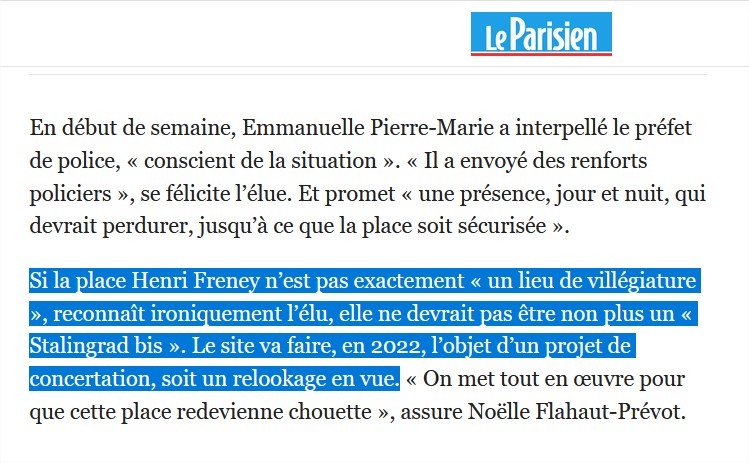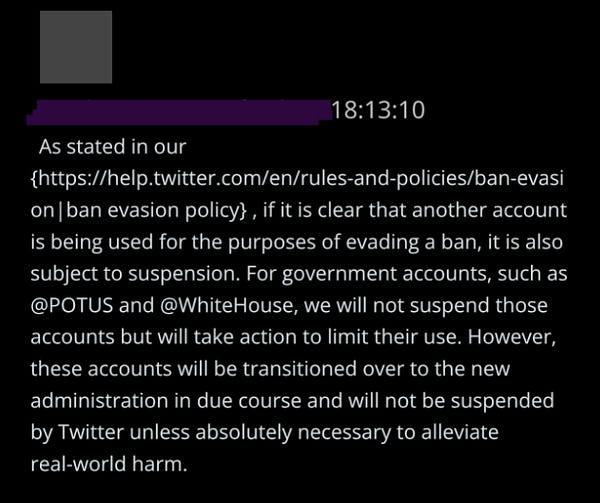
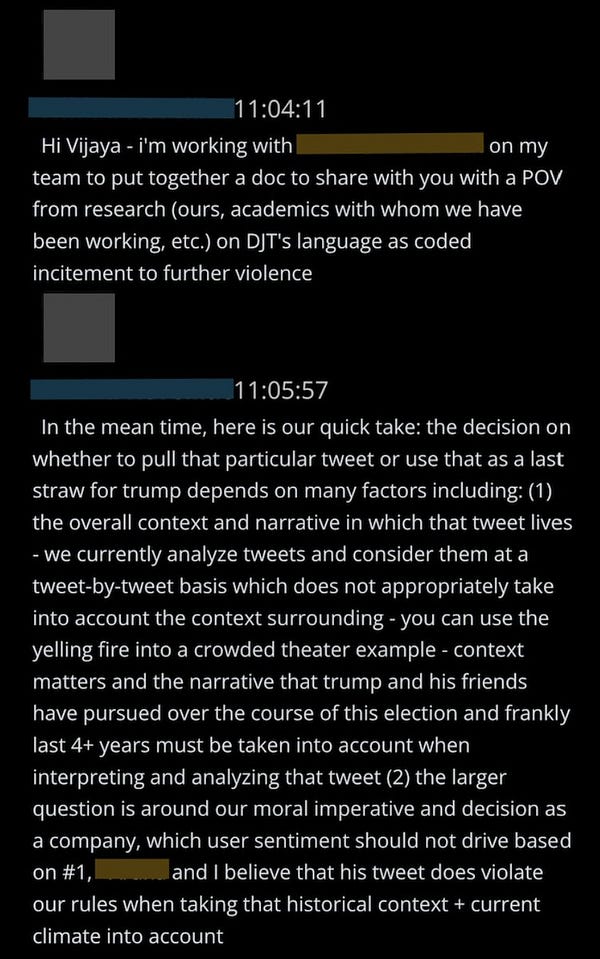
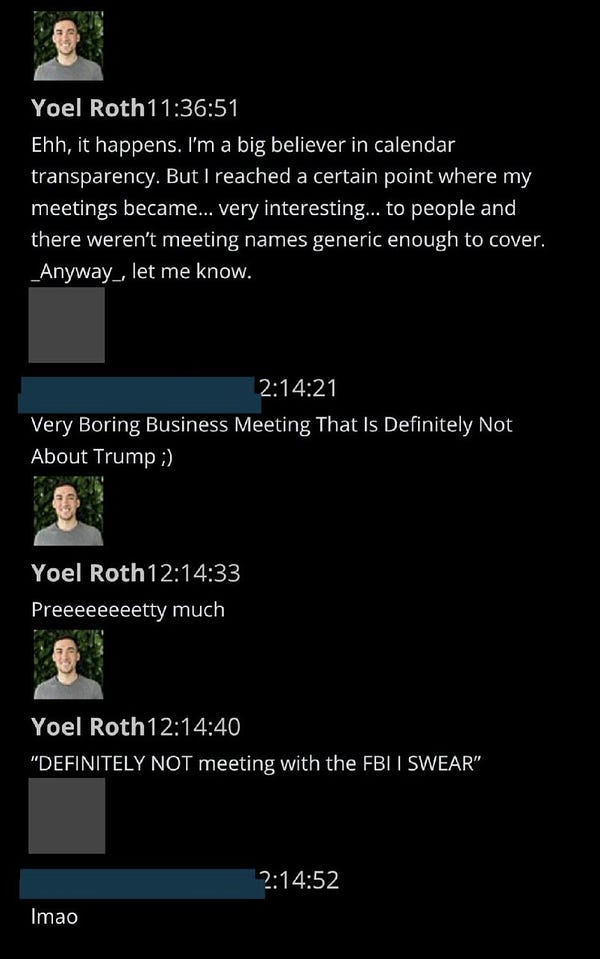
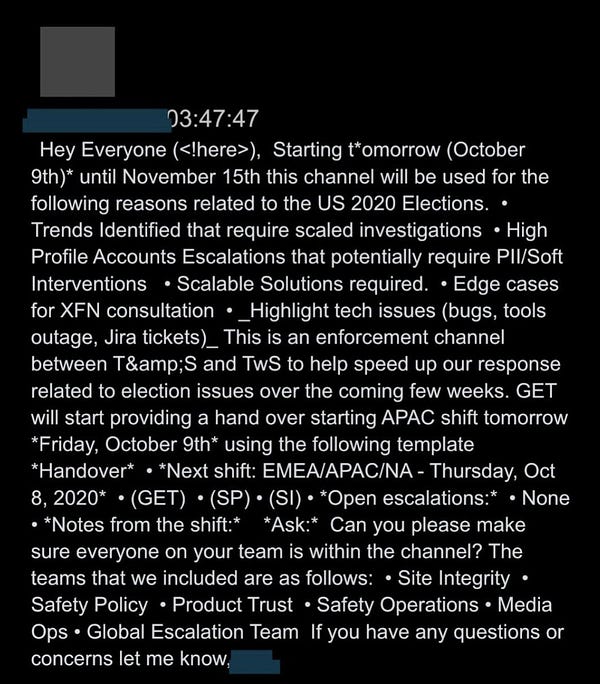
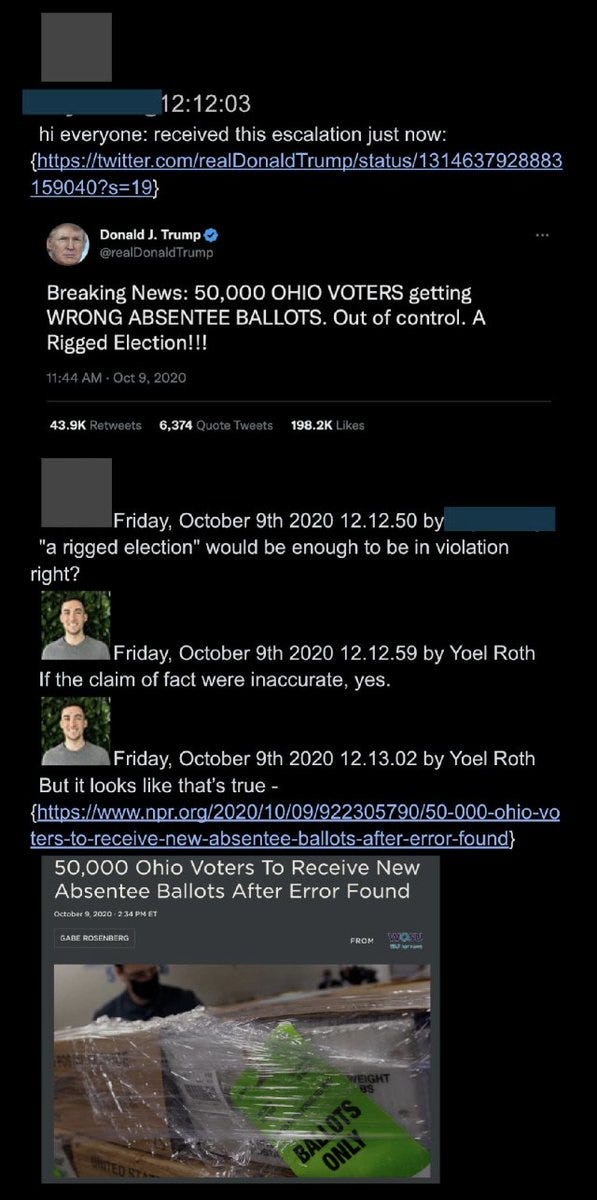
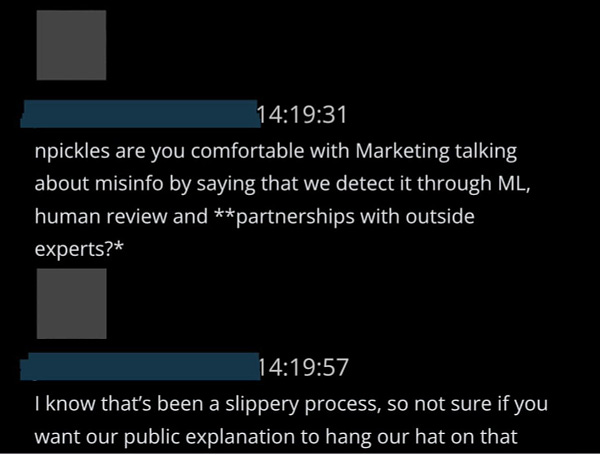
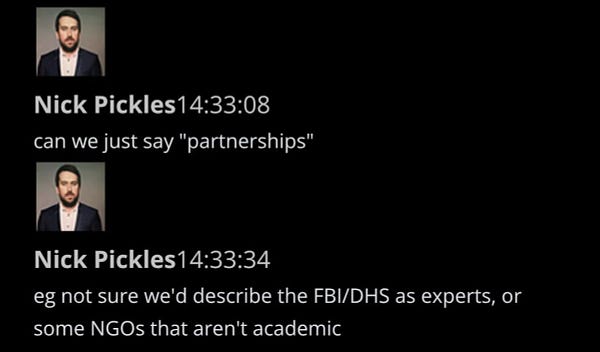
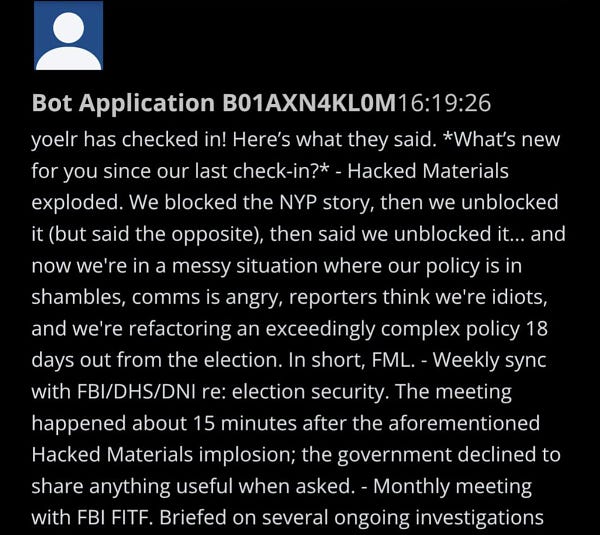
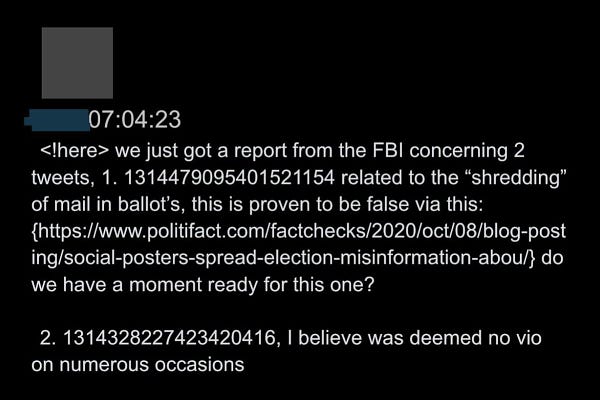
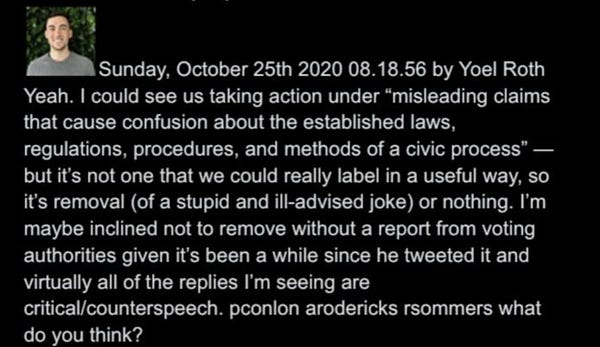
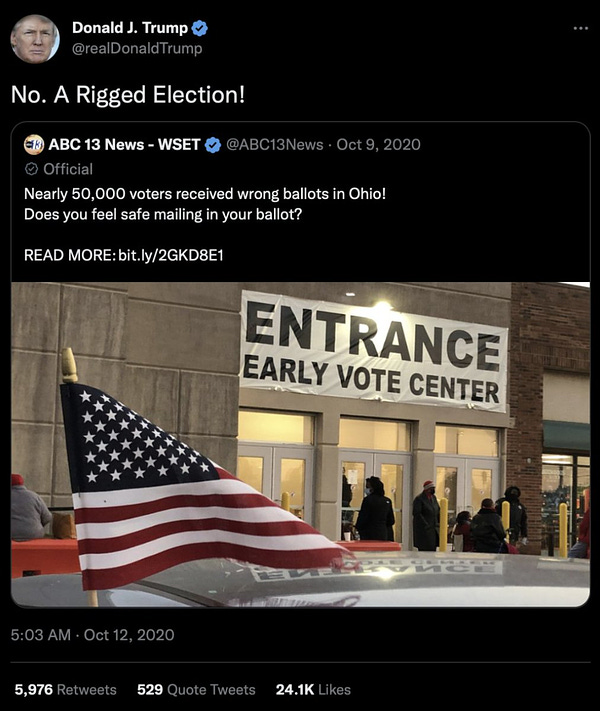
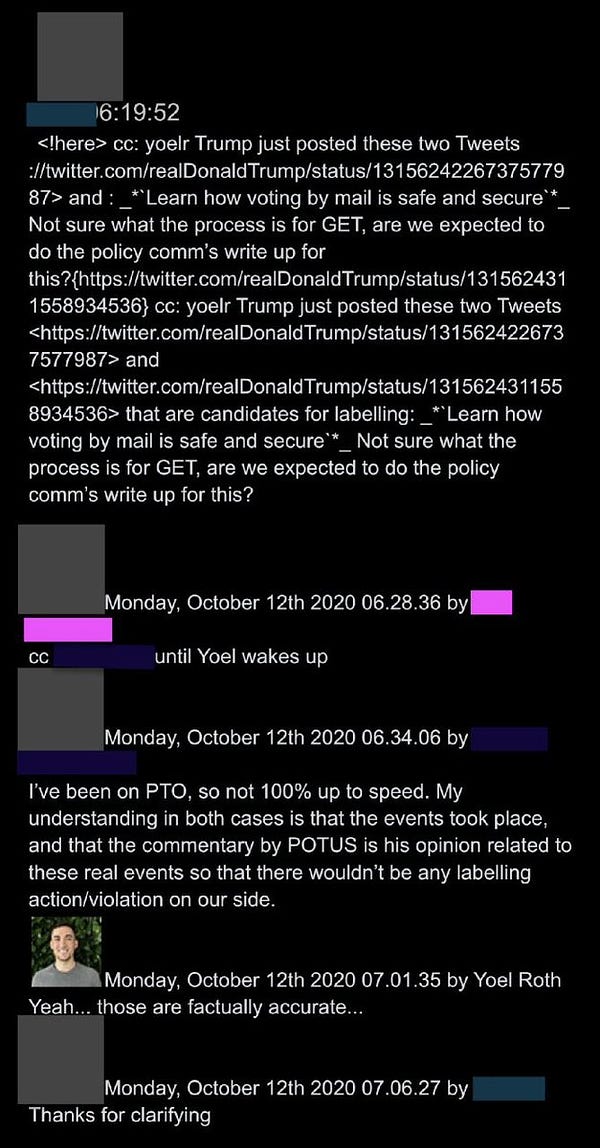
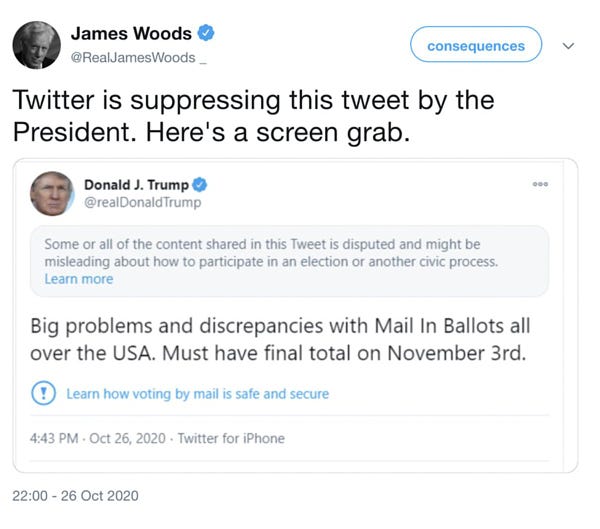
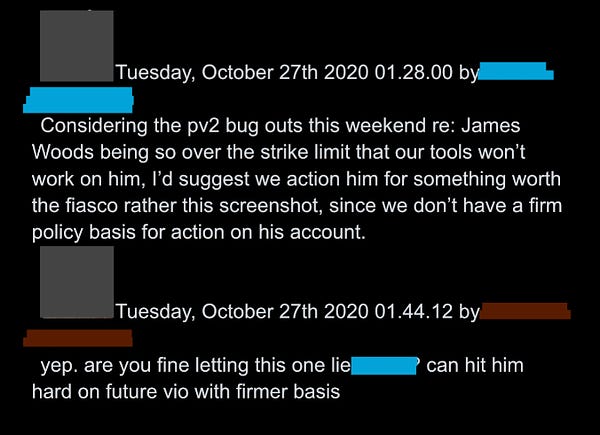
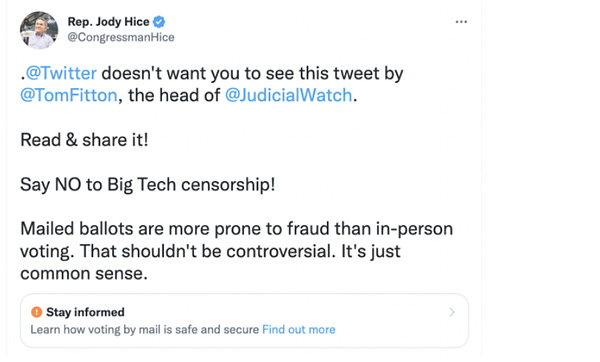
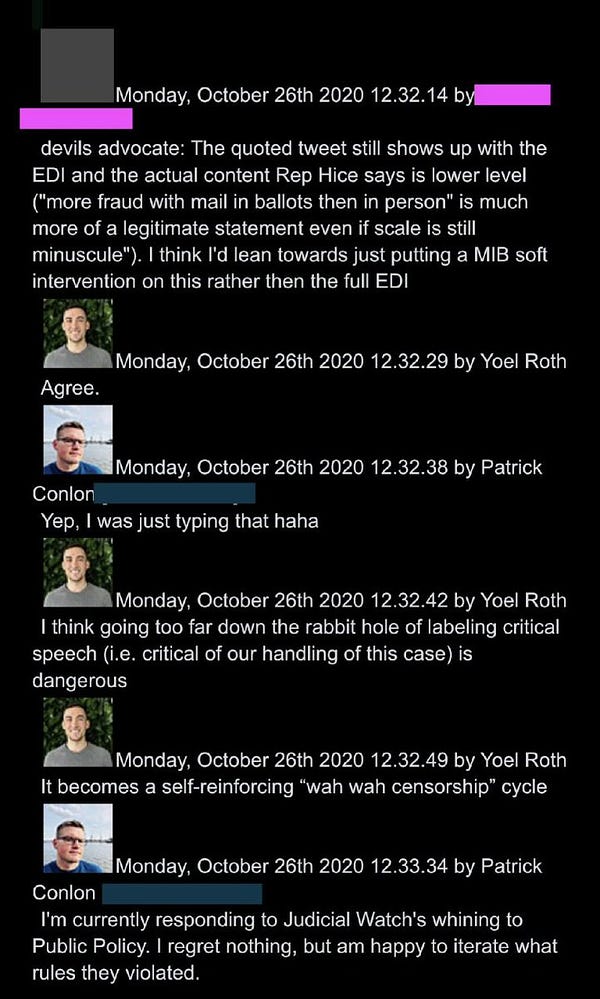
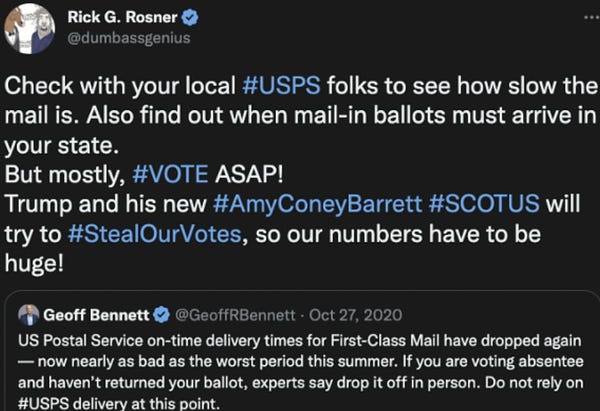
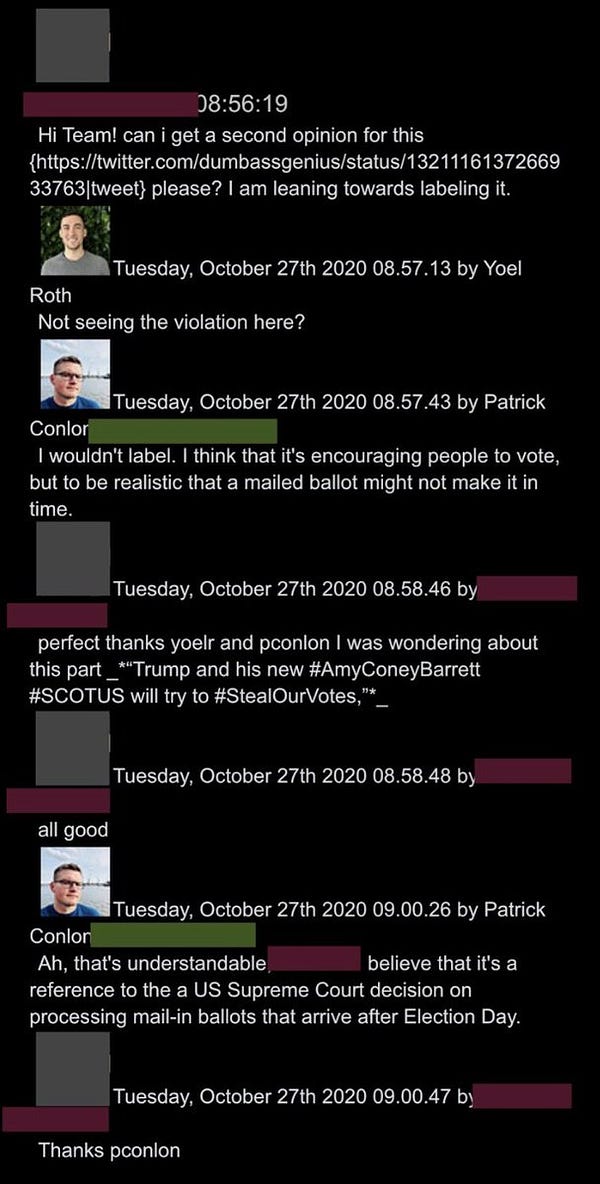
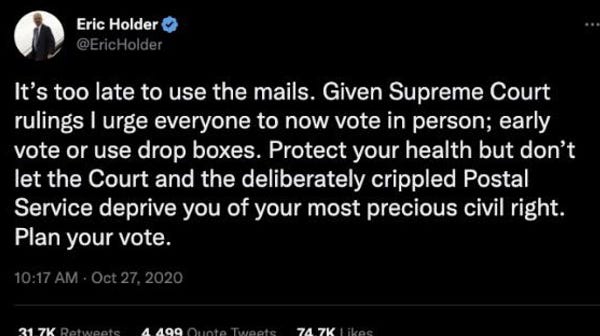
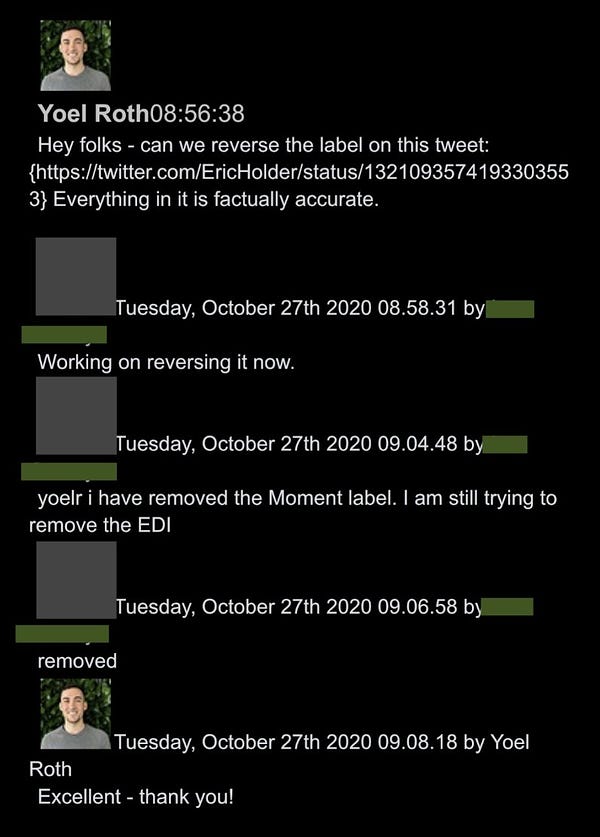
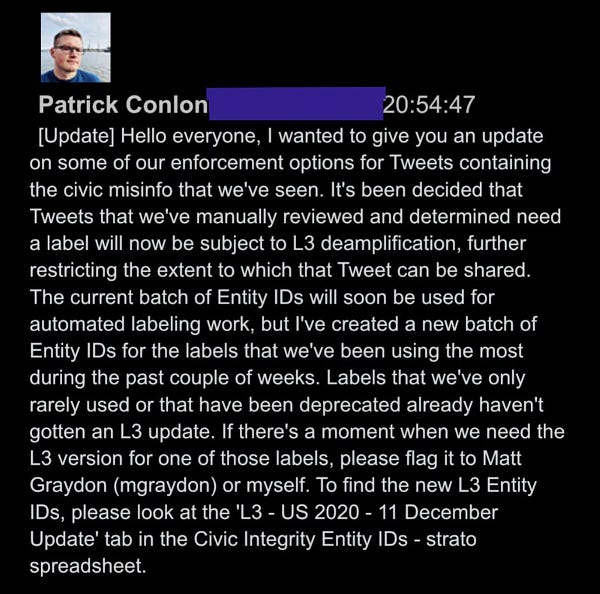
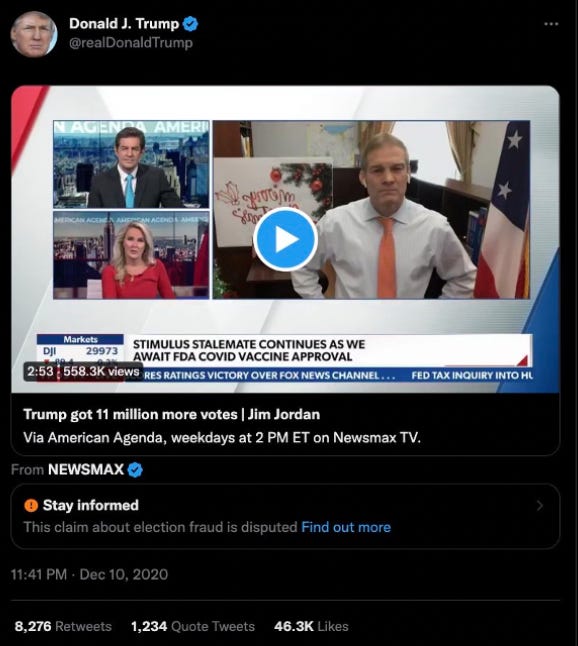
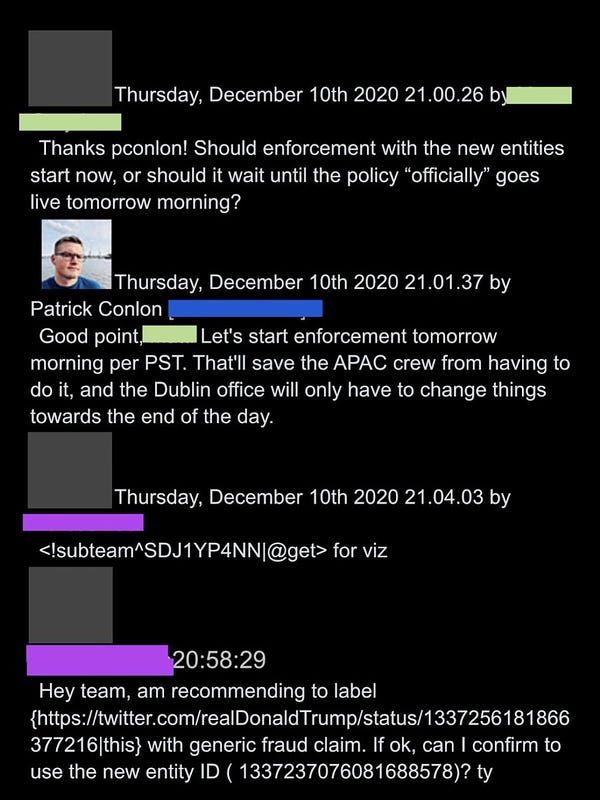
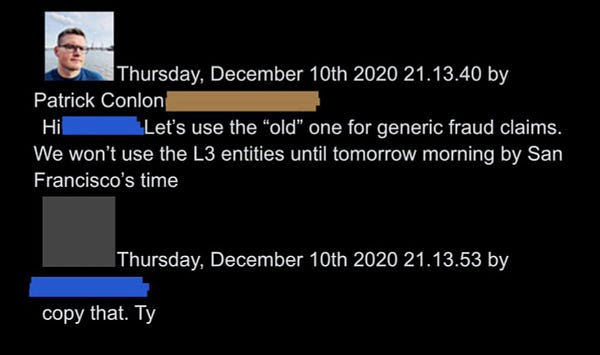
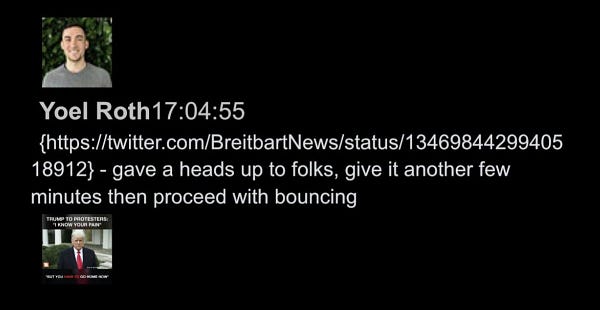
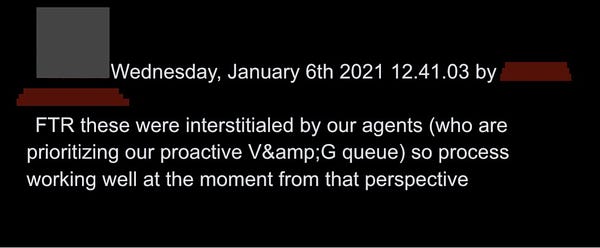
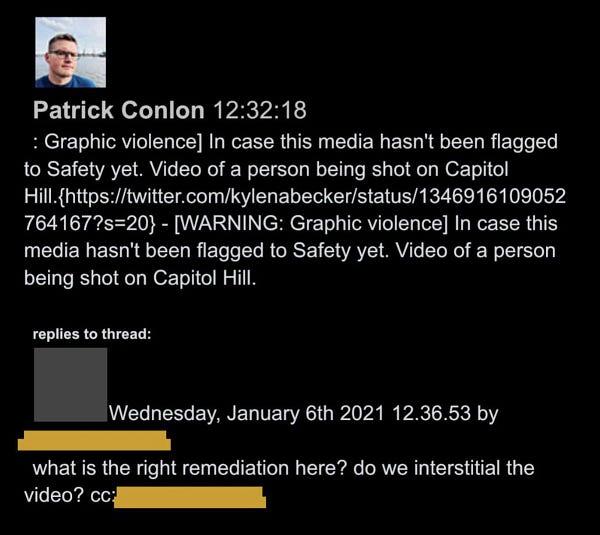
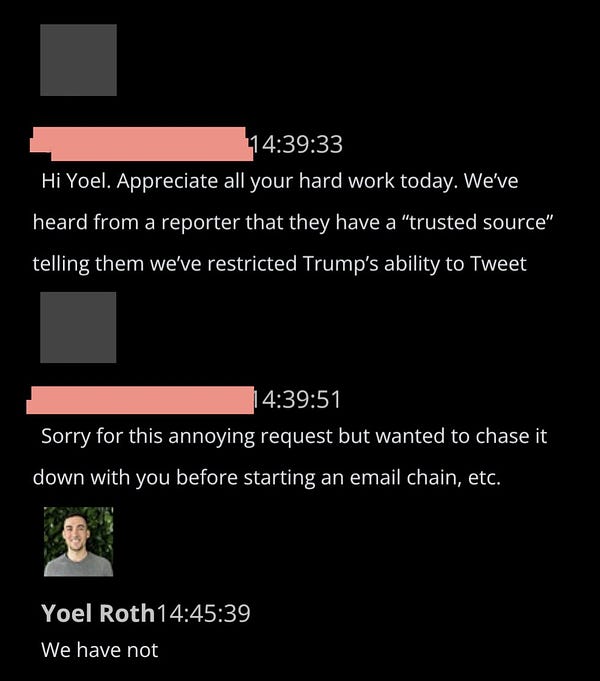
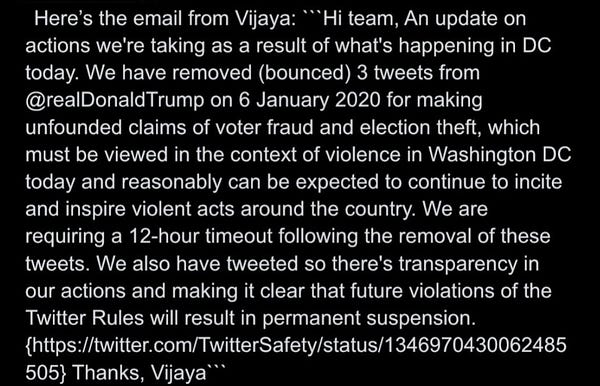
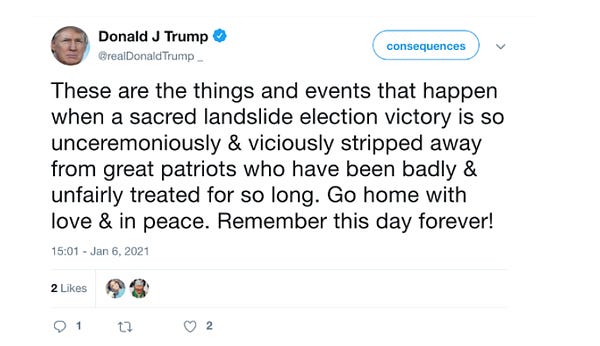
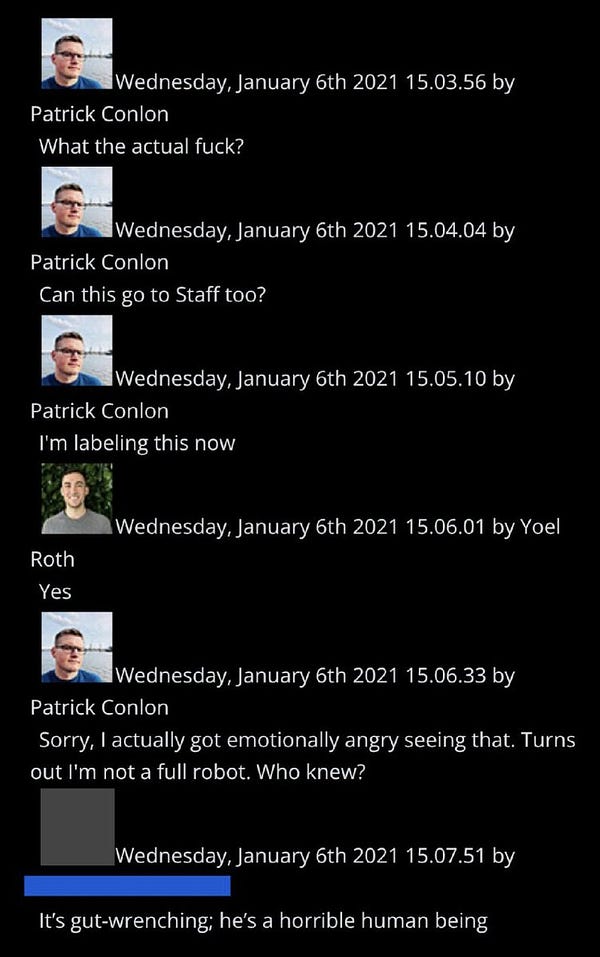
Versement du FBI de 3,5 millions de dollars à Twitter pour censurer les conservateurs…
Pression du FBI sur Twitter pour leur donner des informations qui nécessiteraient légalement des mandats, bien qu’ils n’aient pas de mandats…
Réunions hebdomadaires du FBI avec Twitter avant les élections de 2020 pour leur dire quels tweets étouffer et quels comptes ils suspendre…
Etouffement pa rle FBI FBI de l’histoire de l’ordinateur portable de Hunter Biden était réelle, ils savaient qu’elle sortirait – des semaines avant les élections de 2020 …
Sur-représentation d’anciens employés du FBI sur Twitter …
Quelles caractéristiques classiques d’une opération de désinformation ?
Comme viennent de le confirmer la publication sur Twitter …
D’une série d’échanges entre différents officiels du réseau social au petit oiseau bleu …
Quand après la mise sur écoute de la campagne Trump …
Le faux dossier Steele …
Quatre ans de procédures pour pas moins de deux tentatives de destitution …
Huit mois d’émeutes de rue …
Sans compter, cerise sur le gâteau, le dévoiement de la présidentielle de 2020 …
Et le bannissement, toujours effectif à l’exception de Twitter récemment racheté par Elon Musk, du président et nouveau candidat déclaré Trump lui-même…
Big Tech s’immisce dans les élections américaines …
Ou même le débat sur l’épidémie de Covid …
Avec la complicité de responsables du renseignement..
En supprimant ou en restreignant l’information ?
La publication de documents internes ne fait que confirmer les éléments connus sur la politique de modération du réseau social, mis en cause après la censure d’un article en pleine campagne présidentielle.
Quang Pham
France Télévisions
08/12/2022
Elon Musk promettait une révélation « incroyable ». Samedi 3 décembre, le milliardaire, qui a racheté le réseau social à la fin octobre, a permis la publication des « Twitter Files ». Derrière ce nom se cache un ensemble de documents internes diffusés pour faire la lumière, selon le milliardaire, sur la politique de modération du réseau dans le cadre de la suppression d’un article visant Hunter Biden, le fils de Joe Biden. Cette censure d’un papier du New York Post, intervenue en pleine campagne électorale pour la présidentielle de 2020, avait scandalisé le camp républicain, le sénateur du Texas Ted Cruz dénonçant un « biais anticonservateur » sur Twitter. Mais que révèlent vraiment les « Twitter Files » ? Franceinfo fait le point sur cette affaire qui enflamme le réseau social.
D’où viennent ces « Twitter Files »?
Diffusés dans un long fil sur Twitter par le journaliste américain Matt Taibbi, les « Twitter Files » exposent le contenu d’e-mails et de discussions internes censés illustrer, selon Elon Musk, la politique de « suppression de la liberté d’expression » en vigueur par le passé sur le réseau social. La première partie de ces révélations revient donc sur l’épisode controversé de la censure sur Twitter d’un article du New York Post* publié en octobre 2020, trois semaines avant la présidentielle américaine. Sur la base d’e-mails présentés comme provenant de l’ordinateur portable d’Hunter Biden, le tabloïd accusait le fils du président américain d’avoir tiré profit de la position de son père pour ses relations d’affaires avec Burisma, un géant de l’énergie ukrainien.
Les circonstances à l’origine de cette fuite sont rocambolesques : les informations ont d’abord été recueillies par un réparateur informatique qui a pu accéder au portable d’Hunter Biden, avant d’être transmises à l’avocat de Rudolf Giulani, l’ancien maire de New York, puis à Steve Bannon, l’ex-conseiller de Donald Trump. De quoi, à l’époque, laisser craindre que les documents présentés par le New York Post aient été manipulés ou acquis de manière illégale. Dans un document officiel diffusé par Politico le 19 octobre 2020, plusieurs anciens hauts responsables du renseignement américain indiquaient que ces courriels présentaient « toutes les caractéristiques classiques d’une opération de désinformation russe » . Depuis, ces fameux documents ont fini par être authentifiés, en mars 2022, par le Washington Post* et le New York Times*mais à ce jour, selon Le Point , aucun conflit d’intérêts impliquant directement Joe Biden n’a pu être démontré. Reste que les soupçons sur la véracité de l’information avaient poussé Twitter, mais aussi Facebook, à restreindre la diffusion de l’article. Les « Twitter Files » décrivent les coulisses de cette décision.
Que révèlent ces documents?
Sur Twitter, le journaliste Matt Taibbi révèle que Twitter a pris des « mesures extraordinaires » pour empêcher la diffusion de l’article du New York Post, telles que la suppression des liens, la publication d’avertissements indiquant que la publication pourrait être « dangereuse » et le blocage de sa transmission par messages directs, « un outil jusqu’alors réservé aux cas extrêmes, comme la pédopornographie ». La décision est alors justifiée par la politique de modération de Twitter qui proscrit la diffusion de contenus issus d’un piratage informatique – ce dont était soupçonné le New York Post – et pouvant être utilisés, d’après le règlement du réseau*, à des fins de « manipulation du débat public ».
Mais cette procédure est loin de faire l’unanimité au sein du groupe, assure Matt Taibbi. Plusieurs employés soulignent ainsi l’absence de certitudes quant à la réalité du piratage. « J’ai du mal à comprendre sur la base de quelle disposition de notre politique, nous pouvons signaler cela comme ‘non sûr’. Je pense que le meilleur argument [pour expliquer] cette affaire en externe serait que nous attendons de comprendre si cette histoire est le résultat de contenus piratés », écrit Trenton Kennedy, responsable de la communication, dans un mail interne publié par Matt Taibbi. Nous ferons face à des questions difficiles à ce sujet, si nous ne disposons pas d’une argumentation solide. »
Plus largement, Matt Taibbi révèle que les demandes de modération du réseau social étaient devenues « routinières », émanant aussi bien du parti républicain que du parti démocrate. En 2020, des requêtes provenant de la Maison Blanche, occupée alors par Donald Trump, comme de l’équipe de campagne de Joe Biden ont ainsi été honorées, remarque le journaliste. Sans en apporter la preuve, Matt Taibbi affirme toutefois que le système était « déséquilibré » en faveur des démocrates en raison des orientations politiques « à gauche » des employés de Twitter.
S’agit-il de nouvelles révélations ?
Non, pas vraiment, car les « Twitter Files » ne font en fait que corroborer des éléments déjà rendus publics à l’époque de l’affaire. Devant la bronca des républicains, le réseau social était revenu sur sa décision de bloquer l’article du New York Post au bout de deux jours. Par ailleurs, en novembre 2020, Jack Dorsey, l’ancien patron de Twitter, avait dû s’expliquer lors d’une audition devant le Sénat (PDF, en anglais) sur les dysfonctionnements de la politique de modération du réseau social et le contexte de la censure de l’article sur le fils de Joe Biden.
Quelles sont les réactions?
Sur Truth Social*, le réseau social alternatif fondé par Donald Trump après avoir été banni de Twitter, l’ancien président des Etats-Unis a réagi en dénonçant une « fraude massive » pendant l’élection présidentielle, accusant les « Big Tech » de collusion avec les démocrates. La Maison Blanche*, quant à elle, a commenté la publication des « Twitter Files » en considérant que ces derniers ne représentaient qu’une « distraction » ne révélant que de « vieilles histoires ».
« Ce n’est pas vraiment la preuve irréfutable, que nous espérions », a reconnu Miranda Devine, éditorialiste au New York Post, sur Fox News*. « J’ai le sentiment qu’Elon Musk a retenu certains documents » a-t-elle ajouté, suggérant (sans les apporter) que des preuves existeraient sur l’implication du FBI et des services de sécurité dans la censure de l’article du New York Post. Elon Musk a promis la publication d’un second volet des « Twitter Files », sans préciser s’ils seront en lien avec l’affaire Hunter Biden.
* Les liens signalés par un astérisque renvoient vers des contenus en anglais.
‘I’m treated worse than Hamas’: Fury at Twitter’s ‘secret blacklist’ and ‘visibility filtering’ as new tranche of files reveal conservatives were marked ‘do not amplify’ and COVID lockdown skeptics ‘shadow banned’
Journalist Bari Weiss revealed Thursday night that conservatives and lockdown skeptics were deliberately down-ranked by Twitter
Fox News’s Dan Bongino, youth activist Charlie Kirk, and Stanford CDC critic Dr Jay Bhattacharya were targeted to stop their accounts from gaining prominence
Weiss and journalist Matt Taibbi have been handed a trove of documents from Twitter, detailing why the company censored the story of Hunter Biden’s laptop
The documents from Taibbi showed panic among senior Twitter staff in October 2020 when the New York Post reported on the contents of Hunter’s computer
Jack Dorsey and his head of legal, Vijaya Gadde, both denied that Twitter ever deliberately downgraded or ‘shadow banned’ any accounts
Harriet Alexander
The Daily Mail
9 December 2022
Twitter kept a ‘secret blacklist’ of topics and accounts to prevent them from trending, according to data obtained by journalist Bari Weiss – with conservative commentators deliberately downplayed in what one called ‘Soviet-style bulls***’,’ while another said he was treated ‘with more censorship than Hamas’.
Specialist teams were put to work dealing with 200 cases a day.
Conservative commentators, including Dan Bongino and Charlie Kirk, were deliberately put on a ‘search blacklist’ in Bongino’s case or tabbed ‘do not amplify,’ in the case of Kirk.
‘They’re treating my Twitter account with more scrutiny and censorship than the prime minister of Iran, than Hamas, than people who do actual terroristic type damage,’ said Kirk. ‘Now we have evidence to show that’s exactly why my Twitter account the last couple years has been down 95 percent in engagement.’
Bongino said it was ‘Soviet-style bulls***.’
Those who questioned the prevailing COVID orthodoxy of lockdowns and mask mandates, such as Stanford’s Dr Jay Bhattacharya who argued that lockdowns harmed children, were also placed on a ‘search blacklist.’
Weiss made the revelations on Twitter Thursday night in the second tranche of what has been termed The Twitter Files.
She reported that Twitter used what was termed ‘visibility filtering’ to downplay accounts they objected to, and had teams of people working to reduce the traction gained by individuals or their tweets.
The teams working to minimize certain accounts or topics were backed up by a top-level ‘Site Integrity Policy, Policy Escalation Support’ team – where the CEO and top legal advisors would decide sensitive cases of censorship. Jack Dorsey and his successor as CEO, Parag Agrawal, were on the team.
Top officials such as Yoel Roth, the global head of trust and safety, wrote in internal messages that he wanted more creative ways of censoring and muffling specific accounts and content.
Elon Musk, who bought Twitter in October for $44 billion, was gleeful about the revelations regarding the company he now owns – retweeting Weiss’ thread, with a popcorn emoji.
Dr Jay Bhattacharya, who argued that COVID lockdowns harmed children, was also placed on a ‘search blacklist’ by Twitter, according to Weiss
‘The inmates were running the asylum’: Elon Musk calls out former safety czar Yoel Roth and confirms right-wing accounts were suspended
Elon Musk confirmed that conservatives were banned from Twitter despite not violating any policies.
The latest installment of the Twitter Files showed the scale of censorship and ‘visibility filtering’ on the social media platform.
Musk, who bought Twitter in October for $44 billion, vowed to end the practice of ‘shadow banning’ – secretly downgrading a person’s tweets or trending themes to minimize their reach.
Musk, 51, singled out Yoel Roth, the global head of trust and safety, who wrote in internal messages that he wanted more creative ways of censoring and muffling specific accounts and content.
Yoel Roth was the global head of trust and safety at Twitter. Musk on Thursday highlighted a 2017 tweet in which Roth referred to the Trump White House as being full of ‘actual Nazis
‘As @bariweiss clearly describes, the rules were enforced against the right, but not against the left,’ he said, adding that the company was ‘working on a software update that will show your true account status, so you know clearly if you’ve been shadowbanned, the reason why and how to appeal.’
He added: ‘Truth brings reconciliation.’
Within Twitter, the practice was termed ‘visibility filtering’, Weiss reported.
‘Think about visibility filtering as being a way for us to suppress what people see to different levels. It’s a very powerful tool,’ one senior Twitter employee told her.
Twitter would block searches of individual users, make a specific tweet less easy to find, block posts from the ‘trending’ page, and remove them from hashtag searches.
Another source, a Twitter engineer, told Weiss: ‘We control visibility quite a bit. And we control the amplification of your content quite a bit. And normal people do not know how much we do.’
Weiss said that the matter was dealt with by Twitter’s Strategic Response Team – Global Escalation Team, known as SRT-GET – a group that handled 200 cases a day.
A higher-level team, known as SIP-PES, ‘Site Integrity Policy, Policy Escalation Support,’ dealt with more complex and high-profile cases.
Dorsey and his replacement as CEO, Parag Agrawal, sat on the group, as did Gadde and Yoel Roth, the global head of trust and safety.
Roth messaged colleagues on Slack to say that ‘spam enforcements’ had been used as a way of circumventing the safety team ‘under-enforcing their policies’.
The group would need to intervene if any action was taken to limit the popular account @LibsofTiktok – whose account was tabbed internally: ‘Do Not Take Action on User Without Consulting With SIP-PES.’
Weiss said that account was suspended six times in 2022, and the author, Chaya Raichik, blocked from her account for at least a week each time.
Her account was suspended, they told Raichik, due to violations of Twitter’s ‘hateful conduct’ policy – but internally, Twitter admitted there was no violation.
In an October 2022 memo from SIP-PES obtained by Weiss, the committee concluded that the account ‘has not directly engaged in behavior violative of the Hateful Conduct policy.’
They justified the suspension by saying her posts encouraged online harassment of ‘hospitals and medical providers’ by insinuating ‘that gender-affirming healthcare is equivalent to child abuse or grooming.’
Weiss said that their response was in sharp contrast to that when Raichik was doxxed, with her home addressed published online. Raichik complained, but Twitter refused to take the tweet down, and it remains on the site to this day.
Raichik tweeted: ‘They suspended me multiple times knowing I never violated any policies. This is what happens when you talk about things that they don’t want you to talk about. So glad those days on Twitter are over. Thank you @elonmusk.’
Musk replied: ‘You’re welcome. Twitter won’t be perfect in the future, but it will be *much* better.’
2.5k
Are you surprised Twitter muffled conservative voices?
Have your say in the comments now
Weiss also singled out Roth for criticism, saying he was active in censoring accounts.
She noted that he had written to an employee on the Health, Misinformation, Privacy, and Identity research team wanting to improve ‘non-removal policy interventions like disabling engagements and deamplification/visibility filtering.’
Roth wrote: ‘The hypothesis underlying much of what we’ve implemented is that if exposure to, e.g., misinformation directly causes harm, we should use remediations that reduce exposure, and limiting the spread/virality of content is a good way to do that.’
He said that Dorsey was supportive of the censorship.
‘We got Jack on board with implementing this for civic integrity in the near term, but we’re going to need to make a more robust case to get this into our repertoire of policy remediations – especially for other policy domains,’ Roth wrote.
Musk defended Dorsey, however.
‘Controversial decisions were often made without getting Jack’s approval and he was unaware of systemic bias. The inmates were running the asylum,’ he said on Thursday night.
‘Jack has a pure heart imo.’
In October 2020, journalist Dave Rubin asked then-CEO Jack Dorsey: ‘Do you shadow ban based on political beliefs? Simple yes or no will do.’
Dorsey replied: ‘No.’
Vijaya Gadde, Twitter’s head of legal, policy, and trust, also denied that Twitter operated such blacklists.
‘We do not shadow ban,’ she said in 2018, according to Weiss – speaking alongside Kayvon Beykpour, Twitter’s head of product.
They added: ‘And we certainly don’t shadow ban based on political viewpoints or ideology.’
Tucker Carlson, Fox News host, immediately seized on Weiss’ report, saying it ‘confirms what many suspected but none knew for certain – which is that Twitter routinely censored prominent critics of the Biden administration, with no factual justification whatsoever.’
He noted the example of the Stanford doctor who was vocal against COVID lockdowns and was blacklisted, saying it was ‘doubtless at the request of the authorities’.
Carlson continued: ‘They prevented his tweets from trending which meant most of his tweets couldn’t be seen.
‘According to Weiss, at one point they slapped him with a search ban. That made it impossible for users to find tweets by him, because they were inaccurate?
‘No, because they were accurate. That was the crime. That’s always the crime. They never punish you for lying, they only punish you for telling the truth.’
He added: ‘It was strategic. They weren’t censoring people because they were annoying, they were censoring people because they were providing factual information that might have stopped certain policies or election results from happening.
‘So, you know, this was sophisticated – and had an effect on American society, I would say.’
Kirk told Carlson on Thursday night that the report confirmed his long-held suspicions, but said he was angry.
He says he was averaging 115,000 retweets a day at their peak – questioning COVID lockdowns, for example.
‘I was called a conspiracy theorist, I was smeared,’ Kirk told Carlson, adding that he complained and met Dorsey personally. Dorsey assured him that shadow banning was not happening.
Kirk said the social media company was censoring him because ‘they saw what I had to say as a direct threat to the regime.’
He said: ‘They’re treating my Twitter account with more scrutiny and censorship than the prime minister of Iran, than Hamas, than people who do actual terroristic type damage.
‘Now we evidence to show that’s exactly why my Twitter account the last couple years has been down 95 percent in engagement.
‘Were they told to do this by the federal government?’ he asked, describing how he watched the Twitter change from a social media platform into a ‘Democrat super PAC.’
He added: ‘Apparently asking questions about the lockdown policy was a threat. Were they told to do this by Anthony Fauci, by the federal government?
‘We may never know – but Twitter at its best was a place where heterodox ideas were able to spread. Twitter went out of its way to censor it and suffocate our account.’
He said: ‘I’ve been told forever, so weird that I can’t find you on Twitter, you’re a verified account, your name’s not usual, how come you don’t come up?
‘When I spoke about this on my show I was called a conspiracy theorist and a wacko.
‘My website has been banned by Google Ads; I was banned by YouTube for suggesting that cloth masks don’t work, which is now scientifically proven.
‘Now I find I am on a ‘not safe for work’ shadow ban list on Twitter, because I’ve committed the thought crime of being a conservative.’
He added: ‘Tell me again how we live in a free country.’
Raichik, the @LibsOfTikTok founder, told Carlson by phone that she ‘absolutely sensed I was being censored.’
‘I had a very large account. I never was able to trend, and now we find out I was on the trend blacklist.
‘There were sometimes days or weeks at a time where I felt like my tweets were getting much less engagement than usual, than they should.
‘Now it’s clear that there was suppression and shadow banning.’
Raichik added: ‘The craziest part of this whole thing is that they admitted that I’m not even violating the policies, and they still suspended me seven times. Seven times, three of which were for a week at a time.
‘So I was suspended for probably a month altogether – and for what?
‘Not even violating their policies – just because they don’t like their own views. They don’t want you to see it.’
The first tranche of documents, posted by Matt Taibbi last week, detail how Twitter in October 2020 decided to censor the New York Post’s reporting on the contents of Hunter Biden’s laptop.
They feared the contents were obtained through hacking, but had no evidence to prove it, and it quickly emerged that the laptop had simply been left at a repair store.
Jack Dorsey, the then-CEO of Twitter, admitted that censoring the legitimate reporting was a significant error.
Elon Musk, 51, has vowed that ‘everything we find will be released’ as Twitter continues to release the files surrounding Hunter Biden’s laptop scandal
‘If the goal is transparency to build trust, why not just release everything without filter and let people judge for themselves?’ Dorsey wrote on Twitter
Twitter’s new owner and ‘Chief Twit’ Elon Musk on Wednesday claimed the ‘most important’ Twitter data was ‘deleted’ and ‘hidden’ from the Dorsey.
Musk, 51, has vowed that ‘everything we find will be released’ as his newly acquired company continues to release the Twitter Files.
On Wednesday, Dorsey, 46, replied to Musk’s tweet about delaying the second batch of the Twitter Files, calling for the new CEO to ‘release everything’ at once.
‘If the goal is transparency to build trust, why not just release everything without filter and let people judge for themselves? Including all discussions around current and future actions?’ Dorsey wrote.
‘Make everything public now.’
Musk replied that everything would be released, but even the ‘most important data was hidden (from [Dorsey] too) and some may have been deleted.’
Twitter’s general counsel James Baker FIRED for ‘vetting internal files on Hunter Biden laptop scandal and DELAYING release of the second tranche’: Ex-FBI lawyer was James Comey’s deputy and involved in Russian collusion investigation
The delay of the second tranche of Twitter files came after Elon Musk fired James Baker – Twitter’s general counsel and former FBI general counsel – after discovering he vetted the first installment of the Files, which were sent to journalist Matt Taibbi, from Substack, and Common Sense Editor Bari Weiss.
Musk fired Baker ‘in light of concerns about Baker’s possible role in suppressing information important to the public dialogue.’
Taibbi revealed that Baker’s involvement in the first batch of files was ‘without knowledge of new management.’
‘The process for producing the ‘Twitter Files’ involved delivery to two journalists (Bari Weiss and me) via a lawyer close to new management. However, after the initial batch, things became complicated,’ Taibbi wrote on Twitter.
‘Over the weekend, while we both dealt with obstacles to new searches, it was @BariWeiss who discovered that the person in charge of releasing the files was someone named Jim. When she called to ask ‘Jim’s’ last name, the answer came back: ‘Jim Baker.’
Weiss said her ‘jaw hit the floor’ when she found out.
The first batch of files the two journalists received was titled the Spectra Baker Emails.
The first batch of internal documents showed Baker and other executives discussing Twitter’s October 2020 ban on a news report about Hunter’s foreign business deals, based on emails from his abandoned laptop.
Baker, Musk, and the trial of the Democrat lawyer accused of lying to the FBI
James Baker has long been in the crosshairs of Elon Musk.
Baker played a key role in a series of events that led to Democrat lawyer Michael Sussmann going on trial in May, accused of lying to the FBI.
He was not accused of giving the FBI false information, but rather lying about who he worked for.
Elon Musk fired Twitter’s general counsel James Baker (pictured) after discovering he vetted the first installment of the Twitter Files
The saga began when Sussmann was given information from a group of data scientists who analyzed odd internet data they thought might suggest clandestine communications between a server for the Trump Organization and a server for Alfa Bank, a Kremlin-linked Russian financial institution.
Sussmann then texted Baker, at the time the bureau’s general counsel, to say he had information the FBI should be aware of.
‘I’m coming on my own — not on behalf of a client or company — want to help the bureau,’ Sussmann wrote in his text to Baker.
Baker testified that he was certain Sussmann was acting as an individual, and would likely not have met him were he working for the Clinton campaign.
Sussmann, a cybersecurity specialist, had worked for the Democratic Party in the context of Russia’s hacking of its servers, and Russia publishing emails from the servers.
Sussmann was also connected to the Democrats via one of his partners at the law firm Perkins Coie, Marc Elias, who was representing the Clinton campaign and hired Fusion GPS.
Yet multiple people – including Elias – testified that Sussmann was indeed acting on his own accord, and argued that actually going to the FBI was not in the interests of the Clinton campaign, which would have preferred a New York Times story drawing attention to the assertions.
The FBI later decided the allegations of links between the Trump campaign and the Russian bank were unfounded.
Musk tweeted during the trial that he thought Sussmann had ‘created an elaborate hoax’ about Russia, in a bid to help Clinton.
On May 16, staunchly pro-Trump Congressman Jim Jordan tweeted: ‘Christopher Steele created the dossier. Glenn Simpson sold it to the press.
‘Michael Sussman took it to the FBI. And Democrats and the media lied to you about it all.’
Musk then replied in agreement. ‘All true,’ he tweeted on May 20.
‘Bet most people still don’t know that a Clinton campaign lawyer, using campaign funds, created an elaborate hoax about Trump and Russia.
‘Makes you wonder what else is fake.’
On May 31, the jury concluded that Sussmann had not lied to the FBI and cleared him.
On Friday, Taibbi published the batch of internal documents, calling them the ‘Twitter Files,’ which included an exchange between Baker and former VP of Global Comms Brandon Borrman.
Borrman asks, regarding banning an article about Hunter Biden under Twitter’s ‘hacked materials’ policy: ‘Can we truthfully claim that this is part of the policy?’
Baker responded, appearing to argue in favor of maintaining the ban, because ‘caution is warranted.’
At the time, the files were determined to have broken Twitter’s hacked materials policy, but Dorsey has since said the call was a mistake.
Critics accused Twitter of swaying the presidential election toward Biden by covering up the data.
Weiss and Matt Taibbi were tapped by Musk to report on the ‘Twitter Files’
Joseph A. Wulfsohn
Fox News
December 9, 2022
A report highlighting the unprecedented Twitter access Elon Musk is apparently granting to independent journalist Bari Weiss has sparked fury among their critics.
Insider reported Wednesday that Weiss « has been given access to Twitter’s employee systems, added to its Slack, and given a company laptop, » according to sources.
« The level of access to Twitter systems given to Weiss is typically given only to employees, one of the people familiar said, though it doesn’t seem she is actually working at the company, » Insider wrote.
Weiss shared the second installment of the « Twitter Files » on Thursday, which revealed that Twitter took measures to shadow-ban users like Stanford University’s Dr. Jay Bhattacharya, a longstanding opponent of COVID groupthink during the pandemic who expressed opposition to lockdowns, as well as prominent conservatives like Fox News host Dan Bongino and Turning Point USA’s Charlie Kirk.
She also reported that Twitter internally acknowledged that Libs of TikTok, whose account was repeatedly suspended for allegedly violating its « hateful conduct » policy, « has not directly engaged in behavior violative of the Hateful Conduct policy. »
The Insider report noted that Weiss’ Twitter access appears to have gone beyond that given to Matt Taibbi, the Substack journalist who reported on the first installment of the so-called « Twitter Files » last week.
Liberal media critics on Twitter lambasted Musk’s reported move to bring in Weiss while leveling the same public relations accusation against her that they used on Taibbi last week.
« This is all normal stuff if you’re onboarding a new hire to your comms team, » Washington Post tech columnist Taylor Lorenz reacted.
« The most obvious and hilarious PR campaign masquerading as investigative journalism you will ever see, » Vice News correspondent Roberto Aram Ferdman tweeted.
MSNBC columnist Marisa Kabas wrote, « sure sounds like bari weiss is twitter’s new publicist. »
« [S]o bari weiss is doing: a.) an internal witch-hunt for a private company and b.) external PR for said company, » Smithsonian Magazine senior editor Ted Scheinman wrote, adding « no real journalist would agree to this unholy amalgamation. the basest hackery. »
« Weiss is an opinion writer/activist, not an investigative journalist. Her whole MO is to look for stories that might be generally unrepresentative, but reflect her worldview, and not do any additional digging that challenges that worldview. View the scoops that follow accordingly, » Georgetown Professor Don Moynihan slammed the journalist.
Bari Weiss left The New York Times in 2020 to launch her own Substack and podcast, accusing the paper of allowing Twitter to become its « ultimate editor. » (Getty Images/Bari Weiss)
« Hope media folks don’t get duped by this and refer to anything Weiss or Taibbi are doing as journalism or that they are acting in a capacity as journalists, » Yahoo senior editor Steve Mullis tweeted. « It’s extra ironic considering [Elon Musk] rails against ‘unethical journalism’ and yet this is as unethical as it comes. »
Neither Weiss nor Twitter responded to Fox News’ requests for comment.
Weiss is the founder of new media company « The Free Press » and host of the « Honestly » podcast, which she launched following her dramatic exit from The New York Times in 2020 as its opinion page editor.
Musk announced on Tuesday that he had terminated Deputy General Counsel Jim Baker « in light of concerns about Baker’s possible role in suppression of information important to the public dialogue. »
Taibbi subsequently revealed that Baker had vetted the first batch of the « Twitter Files » without Musk’s knowledge.
Taibbi explained, « The process for producing the ‘Twitter Files’ involved delivery to two journalists (Bari Weiss and me) via a lawyer close to new management. However, after the initial batch, things became complicated. Over the weekend, while we both dealt with obstacles to new searches, it was @BariWeiss who discovered that the person in charge of releasing the files was someone named Jim. When she called to ask ‘Jim’s’ last name, the answer came back: ‘Jim Baker.’
« ‘My jaw hit the floor,’ says Weiss, » Taibbi wrote.
Journalist Matt Taibbi revealed the « Twitter Files » revelations one tweet at a time on Friday. (Daniel Zuchnik/WireImage/Getty Images)
The Substack writer then shared a screenshot of first batch of files both he and Weiss received, which were labeled « Spectra Baker Emails. »
« Baker is a controversial figure. He has been something of a Zelig of FBI controversies dating back to 2016, from the Steele Dossier to the Alfa-Server mess. He resigned in 2018 after an investigation into leaks to the press, » Taibbi told his followers. « The news that Baker was reviewing the ‘Twitter files’ surprised everyone involved, to say the least. New Twitter chief Elon Musk acted quickly to ‘exit’ Baker Tuesday. »
Baker did surface in the first installment of the so-called « Twitter Files » shared by Taibbi Friday night.
While revealing internal discussions over how to explain Twitter’s suppression of the Hunter Biden laptop story during the 2020 election, Baker told his colleagues, « I support the conclusion that we need more facts to assess whether the materials were hacked » but added « it’s reasonable for us to assume that they may have been and that caution is warranted. »
Additionally, Taibbi initially reported, « Although several sources recalled hearing about a ‘general’ warning from federal law enforcement that summer about possible foreign hacks, there’s no evidence – that I’ve seen – of any government involvement in the laptop story. »
It is unclear whether Baker’s involvement in vetting the « Twitter Files » led Taibbi to draw that conclusion and whether Baker omitted files that would have shown the federal government intervening in Twitter’s suppression of the Hunter Biden laptop story.
Musk had been vocal about being transparent when it comes to Twitter’s past and present actions when it comes to curating content on the platform, including censored content.
Twitter infamously blocked its users from sharing the New York Post’s reporting of Hunter Biden’s laptop in tweets and in direct messages.
At the time, Twitter Safety alleged that the articles were in violation of its « hacked materials policy. » Twitter’s then-CEO Jack Dorsey admitted his companies actions were a mistake.
Some critics believe the suppression of the Hunter Biden scandal by Big Tech and the media at large was enough to sway the election in favor of his father.
The mistaken claims in 2020 by former spooks about Hunter Biden’s emails framed the social-media site’s decision to block the news.
The Editorial Board
The Wall Street Journal
Dec. 4, 2022
‘Twitter Files’ Paint an Ugly Portrait
Jim Geraghty
The National Review
December 5, 2022
Opening the ‘Twitter Files’
The revelations of the “Twitter Files” paint an ugly portrait of the individuals who made decisions about standards of content on Twitter during the 2020 presidential campaign. The company’s senior management — oddly, without consulting or involving CEO Jack Dorsey — basically decided unilaterally that people shouldn’t be allowed to read the New York Post’s article, which laid out emails indicating that Hunter Biden introduced his father, then-Vice President Joe Biden, to a top executive at a Ukrainian energy firm, “less than a year before the elder Biden pressured government officials in Ukraine to fire a prosecutor who was investigating the company.”
Twitter’s new owner, Elon Musk, gave reporter Matt Taibbi access to internal company emails and records, and Taibbi laid out in a series of tweets how the company “took extraordinary steps to suppress the story, removing links and posting warnings that it may be ‘unsafe.’ They even blocked its transmission via direct message, a tool hitherto reserved for extreme cases, e.g. child pornography.”
The reasoning behind the ban of the article was the contention that it included “hacked materials,” even though there was no evidence of hacking. The Post said the information was obtained from a computer that was dropped off at a repair shop in Biden’s home state of Delaware in April 2019 and never reclaimed. This was not electronic theft; this was old-fashioned reporting — and exceptionally bad judgment on Hunter Biden’s part, which at this point shouldn’t seem implausible to anyone.
Note that Twitter made its decision to restrict access to and distribution of the Post story before more than 50 former senior intelligence officials signed a letter contending that the trove of emails from Hunter Biden “has all the classic earmarks of a Russian information operation.” (In retrospect, the characterization of it as an “information operation” instead of a “disinformation operation” was a revealing admission.)
That letter was an extraordinarily irresponsible act by the likes of Jim Clapper, Michael Hayden, Leon Panetta, John Brennan, et. al., because it assumed facts not in evidence, and effectively cashed in on the reputations of those former intelligence officials to persuade the American public to believe something that wasn’t true. Many Americans likely believed that former CIA staff would know something about Russian operations that the rest of us didn’t.
But Twitter’s management can’t pass the buck to those former intelligence officials, because the company made its decision to block access to the Post’s story five days before their letter was published.
I suppose the revelations of the Twitter Files could have been even worse if the Biden campaign or someone in the government had somehow “ordered” Twitter’s management to take these drastic measures. But it’s still atrocious that just about all of Twitter’s management believed its role was to keep news away from the public instead of letting people see the Post’s reporting and draw their own conclusions.
Recall how Twitter touted its purpose back in 2016: “Twitter connects you with the people you’re interested in — whether that’s someone across the world who shares your love for science-fiction, your friends and family, a politician, or your local sports team.”
If, from the beginning, Twitter had declared that, “We are a progressive company, and we are only interested in connecting progressives with other progressives, and we will suspend the accounts of conservative users with little warning and with vague explanations, and we will block the public’s ability to see news that we think might make them want to vote against Democrats,” well, at least then it would have been honest, and most conservatives never would have bothered to set up accounts on Twitter.
You notice that you don’t see many conservatives complaining that they’re being shut out of Mastodon, the social-media network that many progressives flocked to after Elon Musk purchased Twitter. If progressives want to set up their own online community that conservatives can’t join, that’s their right.
This was one of the complications of the “Twitter is a private company, so they can set whatever rules they like” argument. Twitter changed the deal, so to speak, after it had obtained significant authority over a chunk of online public discourse. Twitter attracted its large user base by being seeming politically neutral, and then gradually ratcheted up its attitudes of limiting and suppressing conservative speech.
Perhaps the lone pleasant surprise in the Twitter Files is Democratic congressman Ro Khanna of California, who reached out to Twitter’s head of legal, policy, and trust, Vijaya Gadde, and tried to gently nudge the company away from its censorious actions. Khanna described himself as a “total Biden partisan,” said he was convinced that Joe Biden had done nothing wrong, and characterized the New York Post as “far right.” (Eh, right of center, pugnacious, populist, tabloid, yes. Far-right, no.)
But credit Khanna for being the only figure to point out that, “This seems a violation of the First Amendment principles. . . . A journalist should not be held accountable for the illegal actions of the source unless they actively aided the hack. So, to restrict the distribution of that material, especially regarding a presidential candidate, seems not in the keeping of [the Supreme Court case] New York Times vs. Sullivan.” Khanna added that, “In the heat of a presidential campaign, restricting dissemination of newspaper articles (even if NY Post is far right) seems like it will invite more backlash than it will do good.”
You can find quibbles and beefs with the way Musk and Taibbi handled the story. There was no need to post the email addresses of figures such as Khanna. There are one or two spots where Taibbi’s characterization isn’t as clear as it ought to be, such as when he wrote, “By 2020, requests from connected actors to delete tweets were routine. One executive would write to another: ‘More to review from the Biden team.’ The reply would come back: ‘Handled.’” Apparently, four of the five tweets in the example Taibbi pointed to included nude photos, which seems like an important detail. Most of us would agree there is a substantive difference between “please remove these nude photos of my son that he did not consent to have released or published” and “please remove this information about my son’s business deals with shady foreign figures that is embarrassing to me and my campaign.”
It would have been helpful to have all of this laid out in one document instead of a long series of tweets, and links to source documents also would have helped paint the fullest picture possible.
Yesterday, Howard Kurtz was kind enough to have me appear on his MediaBuzz program on Fox News Channel, and my co-panelist insisted that there was nothing significant in the Twitter files. Curiously, this is a defense — “None of this matters!” — that not even Twitter CEO Jack Dorsey was willing to attempt, either in November 2020 or in hearings the following March. Dorsey said after the election that his team made the wrong decision:
We recognize it as a mistake that we made, both in terms of the intention of the policy and also the enforcement action of not allowing people to share it publicly or privately. . . . We made a quick interpretation, using no other evidence, that the materials in the article were obtained through hacking and, according to our policy, we blocked them from being spread.
When a social-media company decides to block access to a news article out of ideological and political loyalties, that’s newsworthy and consequential, and it’s worth asking, “How did this happen? Who made the decisions that led to this point?”
Former NYT columnist Bari Weiss releases ‘Twitter Files Part Two’
Former New York Times columnist Bari Weiss released the second installment of the “Twitter Files” on Thursday night, sharing images of accounts that Twitter allegedly placed on various types of “blacklists.”
Weiss posted several images of what appears to be an internal Twitter system that marked certain accounts as being under various kinds of “blacklists,” in addition to flagging other information about the accounts.
Jay Bhattacharya, a health policy professor from Stanford University who opposed COVID-19 lockdowns, appeared to have been placed on a “Trends Blacklist,” as was the right-wing Libs of TikTok account, according to the photos.
The account of conservative commentator Dan Bongino was apparently placed on a “Search Blacklist,” while the photos seemed to show Turning Point USA President Charlie Kirk had his account marked as “Do Not Amplify.”
The images also appeared to show that several of the accounts had been flagged with “Recent Abuse Strike” and that more basic information, such as when the accounts were “Twitter Blue Verified” or “High Profile,” had also been noted.
Weiss also shared purported screenshots of internal messages from Yoel Roth, Twitter’s former head of safety and integrity, including one in which he appeared to ask for research on “non-removal policy interventions like disabling engagements and deamplification/visibility filtering.”
Weiss’s Twitter thread is the second installment in what Twitter CEO Elon Musk has dubbed the “Twitter Files.” The first installment, released by independent journalist Matt Taibbi, appeared to show an internal debate at the social media company over how to handle a New York Post story about Hunter Biden.
While the first installment of the “Twitter Files” sparked outrage across right-wing outlets, it seemed to fall flat otherwise, with some criticizing the release for failing to deliver groundbreaking revelations.
The release of the “Twitter Files” comes just over a month after Musk acquired the social media company. The billionaire, who promised to reshape Twitter into a “free speech” platform, shared the trove of internal documents with Weiss and Taibbi in an apparent effort to show that content moderation under the previous management was biased against the political right.
Voir de plus:
We are disturbed by the day’s events in Washington, D.C. and request three actions of Staff: 1. Permanently suspend @realDonaldTrump over his actions on January 62. Provide a clear account of the day’s decision making process regarding the President’s tweets 3. An investigation into the last several years of corporate actions that led to Twitter’s role in today’s insurrection
For the last four years, we have watched right wing extremists grow on our platform, nurtured by @realDonaldTrump. We have seen Twitter leadership struggle to deal with the violent, hateful rhetoric shared by @realDonaldTrump. We have respected those decisions and had faith in those who make them, knowing that settling policy around hate speech and misinformation is nuanced and difficult. We appreciate stronger measures, like the interstitials recently used on his account and his Jan. 6 timeout.
We do not believe these actions are sufficient. Trump is no longer a legitimate democratic actor. In a video posted on Twitter, he called the election “fraudulent” and a “landslide” in his favor, while referring to his loyalists as “very special” even as they broke into the Capitol building and clashed with police. At no point did the outgoing President unambiguously denounce their actions.
We must examine Twitter’s complicity in what President-Elect Biden has rightly termed insurrection. Those acts jeopardize the wellbeing of the United States, our company, and our employees.
First, we request that @realDonaldTrump’s account be suspended permanently, before he can further harm using our platform.
Second, we request more transparent internal communications around Twitter’s civic integrity policy and how it applied.
Third, we request an independent investigation into Twitter’s role in these events. Despite our efforts to serve the public conversation, as Trump’s megaphone, we helped fuel the deadly events of January 6th. We request an investigation into how our public policy decisions led to the amplification of serious anti-democratic threats. We must learn from our mistakes in order to avoid causing future harm.
We play an unprecedented role in civil society and the world’s eyes are upon us. Our decisions this week will cement our place in history, for better or worse.
We do not claim to speak for any other Tweeps than those who add their names here.
The Undersigned
Twitter bans Trump’s account, citing risk of further violence
The suspension amounted to a historic rebuke for a president who had used the social media site to rise to political prominence
A defiant Trump lashed out in response late Friday, accusing Twitter in a statement of having “coordinated with the Democrats and the Radical Left” to remove his account. He threatened regulation, promising a “big announcement” to come, and said he is looking “at the possibilities of building out our own platform in the near future!” The official account for the presidency, @POTUS, also tweeted that message, although the posts were quickly taken down by Twitter.
Twitter had resisted taking action against Trump for years, even as critics called on the company to suspend him, arguing that a world leader should be able to speak to his or her citizens unfettered. But Trump’s escalating tweets casting doubt on the 2020 election — and the riot at the U.S. Capitol his comments helped inspire — led the company to reverse course.
Twitter specifically raised the possibility that Trump’s recent tweets could mobilize his supporters to commit acts of violence around President-elect Joe Biden’s inauguration, an analysis that experts saw as a major expansion in the company’s approach to moderating harmful content online. Its action meant Trump’s tweets disappeared from the site, removing the catalogue of his thoughts except for those preserved by researchers and other documentarians.
The move was especially remarkable for a company that once called itself “the free speech wing of the free speech party.” Many observers noted that this most aggressive enforcement action in Twitter’s history came in the week that political power shifted decisively in Washington, toward Democrats who long have demanded greater policing of hate speech and violent talk on social media — and away from a president and party who long had made effective use of the more freewheeling policies of the past.
“It took blood and glass in the halls of Congress — and a change in the political winds — for the most powerful tech companies in the world to recognize, at the last possible moment, the profound threat of Donald Trump,” said Sen. Richard Blumenthal (D-Conn.), a longtime critic of tech company policies.
Twitter cited two Trump tweets. One stated that the 75 million who voted for him were “American Patriots” who will “not be disrespected or treated unfairly in any way, shape or form!!!” He then announced he would not go to Biden’s swearing-in ceremony later this month.
In a blog post, the company said the two messages violated its policy against glorification of violence since they “could inspire others to replicate violent acts” that took place at the U.S. Capitol on Wednesday. According to Twitter, his second tweet could be read by followers as an encouragement to commit violence during the inauguration, which “would be a ‘safe,’ target as he will not be attending.”
After close review of recent Tweets from the @realDonaldTrump account and the context around them we have permanently suspended the account due to the risk of further incitement of violence.https://t.co/CBpE1I6j8Y
— Twitter Safety (@TwitterSafety) January 8, 2021
In doing so, Twitter joined Facebook in punishing the president in the waning hours of his first term. Facebook said Thursday its suspension is indefinite, lasting at least the next two weeks, citing a similar belief that the risks are “simply too great” at a moment of transition for the country. Both tech giants previously joined Google-owned YouTube in removing or limiting access to Trump’s posts, including a video he shared earlier this week that once again advanced widely disproved falsehoods about the validity of the 2020 vote.
The White House did not immediately respond to a request for comment. But Trump appeared to try to defy Twitter’s ban by using @POTUS, and later his @TeamTrump campaign account, both of which were suspended.
“We will not be SILENCED!” @POTUS tweeted before it was taken down. The president also charged that in a statement.
Twitter’s punishment is the harshest judgment the site has at its disposal. It appeared to be the first time the company had taken such an action since instituting a broad policy around world leaders last year, illustrating the slow shift in Silicon Valley as the country’s most popular, prominent platforms grew more comfortable in taking on Trump.
Facebook, for example, had its first of many furious internal debates over how to handle Trump in December 2015, when as a presidential candidate he posted a video in which he said he wanted to ban all Muslims from entering the United States. Many employees called it obvious hate speech, but top executives chose to defer, by creating an exemption for content they deemed “newsworthy.”
The challenges kept coming as Trump’s presidency and rhetoric brought to mainstream attention right-wing ideas once considered beyond the fringe of appropriate political rhetoric. A particularly explosive flash point for both Twitter and Facebook came in May, when Trump called protesters after the killing of unarmed Black man George Floyd “THUGS” in social media posts. In response, Twitter opted to label Trump’s tweet as harmful and hide it from public view — and Facebook petitioned for Trump to change his tone in private.
The shift within Silicon Valley began even before that as the coronavirus swept through the world last year, and the stakes of the rampant lies and misinformation on social media platforms were underscored by a rising body count as Trump and others denied the severity of the pandemic. Facebook, Twitter, YouTube and others all took action against viral falsehoods that were clearly contrary to science. Not long after, they dramatically stiffened policies against conspiracy theories, such as QAnon, and the rise of dangerous armed groups, such as the boogaloo, born of largely unrestricted online worlds.
As the national election approached last fall, disinformation researchers, Democrats and civil rights activists demanded tougher action from tech companies whose platforms hosted and spread falsehoods. They gained some traction, but at a time when Trump and other Republicans were loudly claiming that they were being discriminated against by Silicon Valley, critics said it was not nearly enough.
Rashad Robinson, the president of Color of Change, a civil rights group that has been pushing social media companies to police Trump’s behavior more aggressively, fretted on Friday that it took too long for Twitter and its peers to act given the president’s past missteps — and their potential to have touched off real-world violence.
“But kicking him off of Twitter, so he can’t spread disinformation and incite the public, is huge,” he said. “This is way too late, but I do not underestimate or undersell the significance of what this means moving forward without him having a direct line to reach an audience any time that he wanted to.”
In considering how his supporters might read and interpret his messages, Twitter also potentially opened the door for the company to take a more aggressive approach on other content, including tweets from political leaders in the future, experts said.
“That’s a standard that’s never existed,” said Alex Stamos, a former Facebook chief security officer, now head of the Stanford Internet Observatory, a disinformation research group. “The ‘impact’ standard has never existed.”
Stamos added that Twitter’s action — and Facebook’s recent enforcement efforts — meant that “the right-wing social media ecosystem in America has been shattered.”
The move comes amid a wave of criticism from Democratic lawmakers and Twitter’s own employees, who demanded in a letter written this week that the company’s leaders permanently suspend Trump’s account. In an internal letter addressed to chief executive Jack Dorsey and his top executives viewed by The Washington Post, roughly 350 Twitter employees requested an investigation into the past several years of corporate actions that led to Twitter’s role in the riot.
“Despite our efforts to serve the public conversation, as Trump’s megaphone, we helped fuel the deadly events of January 6th,” the employees wrote. “We request an investigation into how our public policy decisions led to the amplification of serious anti-democratic threats. We must learn from our mistakes in order to avoid causing future harm.”
“We play an unprecedented role in civil society and the world’s eyes are upon us. Our decisions this week will cement our place in history, for better or worse,” the employees added.
In a statement earlier Friday, Twitter spokesperson Brandon Borrman wrote, “Twitter encourages an open dialogue between our leadership and employees, and we welcome our employees expressing their thoughts and concerns in whichever manner feels right to them.”
The letter from the Twitter employees is addressed to “Staff,” company lingo for C-suite executives who report directly to Dorsey, including Vijaya Gadde, who leads the company’s legal, policy, and trust and safety divisions. During a virtual meeting on Friday afternoon, Dorsey and Gadde shared their thoughts on Twitter’s response, according to an employee, who spoke on the condition of anonymity for fear of retaliation.
Silicon Valley also took fresh aim Friday at a bevy of other sites and services where Trump’s supporters have congregated. That includes the new social media service Parler, which became popular with the president’s allies in the wake of the 2020 election.
Amid a flood of misinformation — and threats of violence in the wake of the Capitol riot — Google on Friday removed the app from its hub for downloads, called the Play Store. Apple also warned Parler that it could be removed from its App Store, the sole portal through which iPhone and iPad users can obtain such software, if it didn’t remove posts inciting violence and put in place a stronger content moderation system, according to an email obtained by BuzzFeed News.
Parler prides itself on only loosely policing posts on its site, saying it removes only what is illegal or not protected by the First Amendment. After the attack on the Capitol this week, posts on the site voiced support for the rioters and calls to keep fighting. Trump, however, does not currently have an account on Parler.
Parler chief executive John Matze appeared to address the Apple news on his Parler page Friday, writing “We will not cave to pressure from anti-competitive actors!”
Twitter’s move did cause unease in another quarter: Researchers have long complained that when the company suspends a user, valuable records of online conversations essentially vanish into thin air, making it nearly impossible to later reconstruct them — something particularly consequential when a platform is the primary means of communication for a U.S. president.
“It has implications from a historical point of view,” said Darren Linvill, lead researcher for the Clemson University Media Forensics Hub. “If you are the national conversation, they just sucked a big part of the national conversation away.”
Rachel Lerman and Gerrit De Vynck contributed to this report.
Voir par ailleurs:
World Leaders on Twitter: principles & approach
15 October 2019
There continues to be meaningful public conversation about how we think about Tweets from world leaders on our service. We welcome the conversation and want to share more context on our principles and process for reviewing reported Tweets from these accounts.
Context
When it comes to the actions of world leaders on Twitter, we recognize that this is largely new ground and unprecedented. We understand the desire for our decisions to be “yes/no” binaries, but it’s not that simple. The actions we take and policies we develop will set precedent around online speech and we owe it to the people we serve to be deliberate and considered in what we do.
Our mission is to provide a forum that enables people to be informed and to engage their leaders directly. We also have a responsibility to the people who use Twitter to better explain why we make the decisions we make, which we will do here.
Our approach
- Everything we do starts with an understanding of our purpose and of the service we provide: a place where people can participate in public conversation and get informed about the world around them.
- We assess reported Tweets from world leaders against the Twitter Rules, which are designed to ensure people can participate in the public conversation freely and safely.
- We focus on the language of reported Tweets and do not attempt to determine all potential interpretations of the content or its intent.
- Presently, direct interactions with fellow public figures, comments on political issues of the day, or foreign policy saber-rattling on economic or military issues are generally not in violation of the Twitter Rules.
- However, if a Tweet from a world leader does violate the Twitter Rules but there is a clear public interest value to keeping the Tweet on the service, we may place it behind a notice that provides context about the violation and allows people to click through should they wish to see the content. We announced this in June.
Enforcement scenarios
We want to make it clear today that the accounts of world leaders are not above our policies entirely. The below areas will result in enforcement action for any account on our service (without consideration of the potential public interest value in allowing the Tweet to remain visible behind a notice):
- Promotion of terrorism;
- Clear and direct threats of violence against an individual (context matters: as noted above, direct interactions with fellow public figures and/or commentary on political and foreign policy issues would likely not result in enforcement);
- Posting private information, such as a home address or non-public personal phone number;
- Posting or sharing intimate photos or videos of someone that were produced or distributed without their consent;
- Engaging in behaviors relating to child sexual exploitation; and
- Encouraging or promoting self-harm.
In other cases involving a world leader, we will err on the side of leaving the content up if there is a clear public interest in doing so.
With critical elections and shifting political dynamics around the world, we recognize that we’re operating in an increasingly complex and polarized political culture. These are constantly evolving challenges and we’ll keep our policies and approach under advisement, particularly as we learn more about the relationship between Tweets from world leaders and the potential for offline harm.
This post seeks to provide clear insight into how we address content from world leaders on Twitter today, and will serve as our statement on the decisions we make, rather than our teams providing feedback on individual Tweets and decisions. We’ve also updated our dedicated Help Center page to provide a significantly more detailed breakdown of how we make decisions regarding the use of the public interest notice.
Our goal is to enforce our rules judiciously and impartially. In doing so, we aim to provide direct insight into our enforcement decision-making, to serve public conversation, and protect the public’s right to hear from their leaders and to hold them to account.
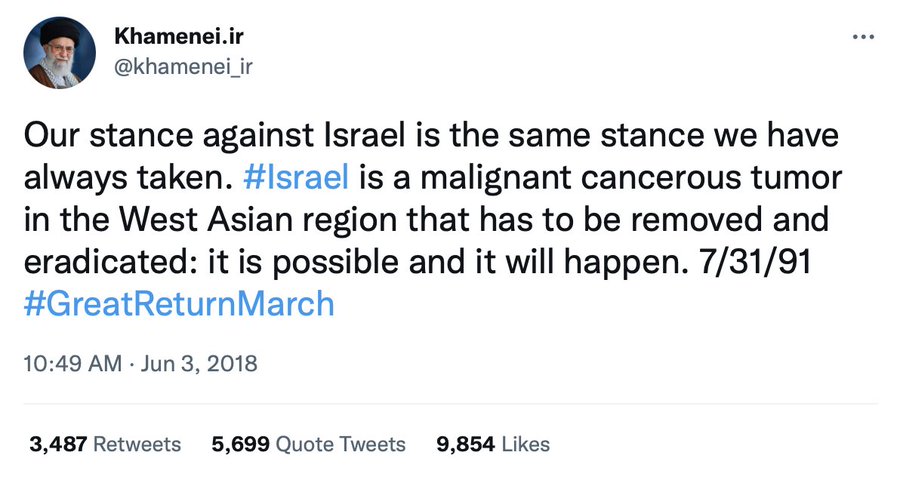
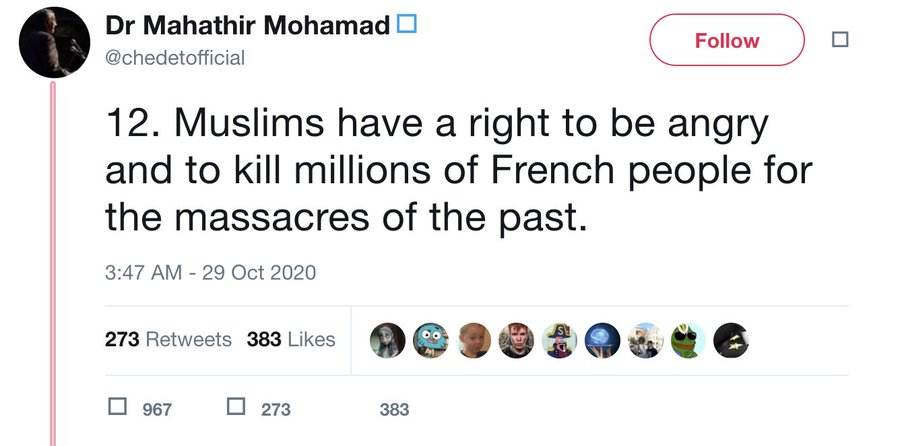
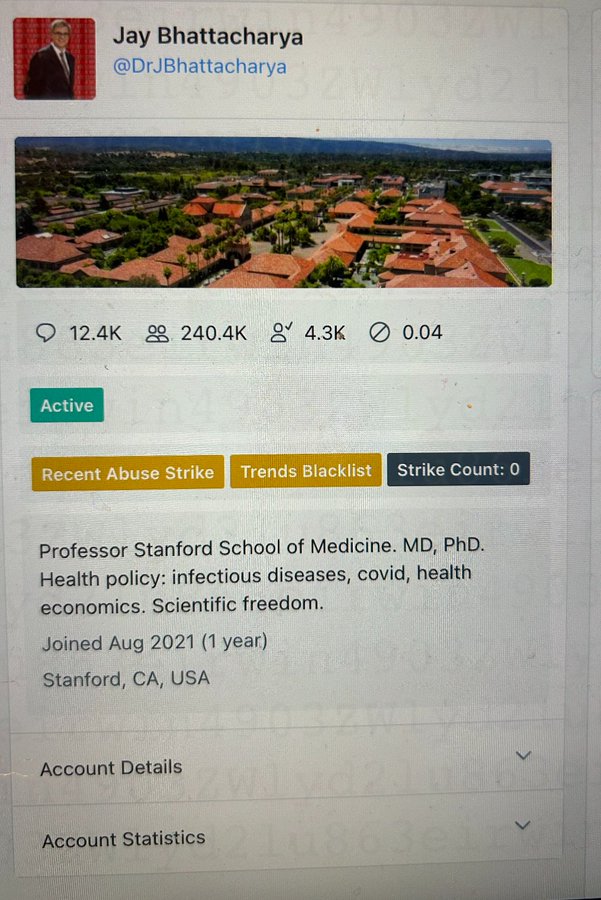
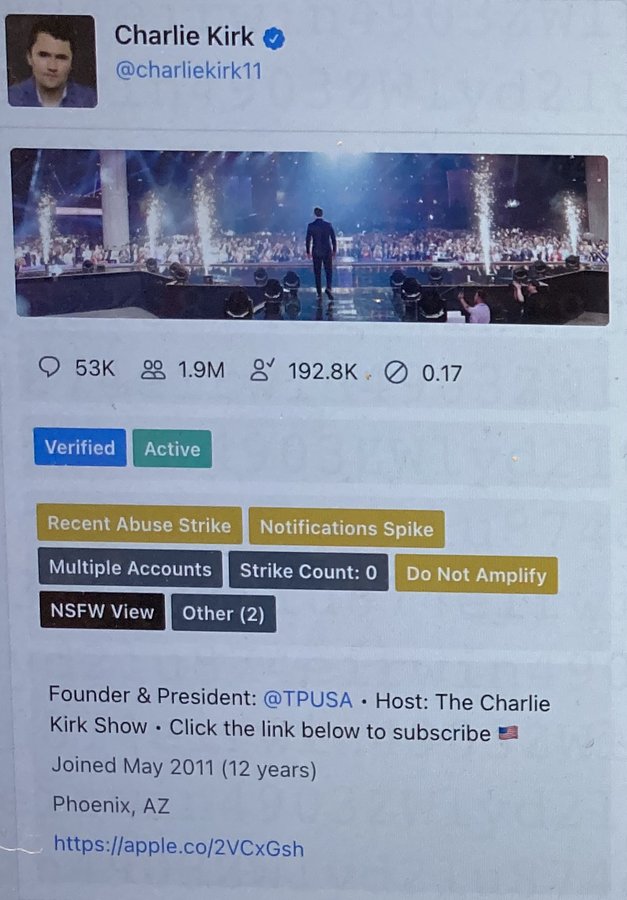


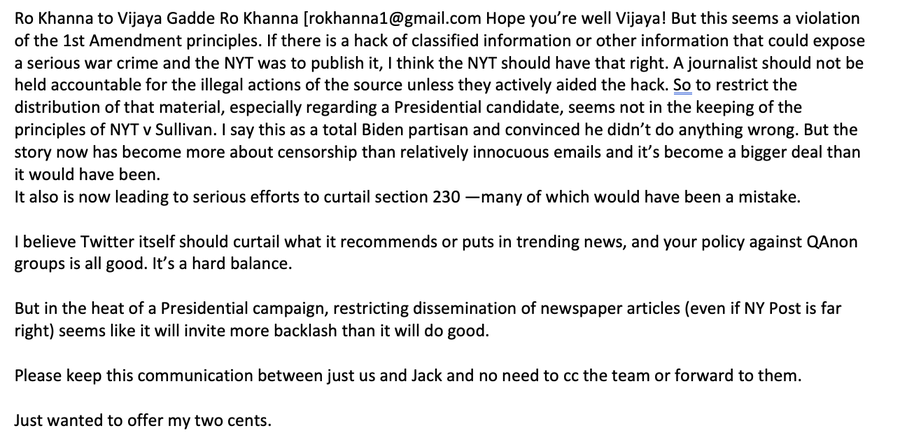

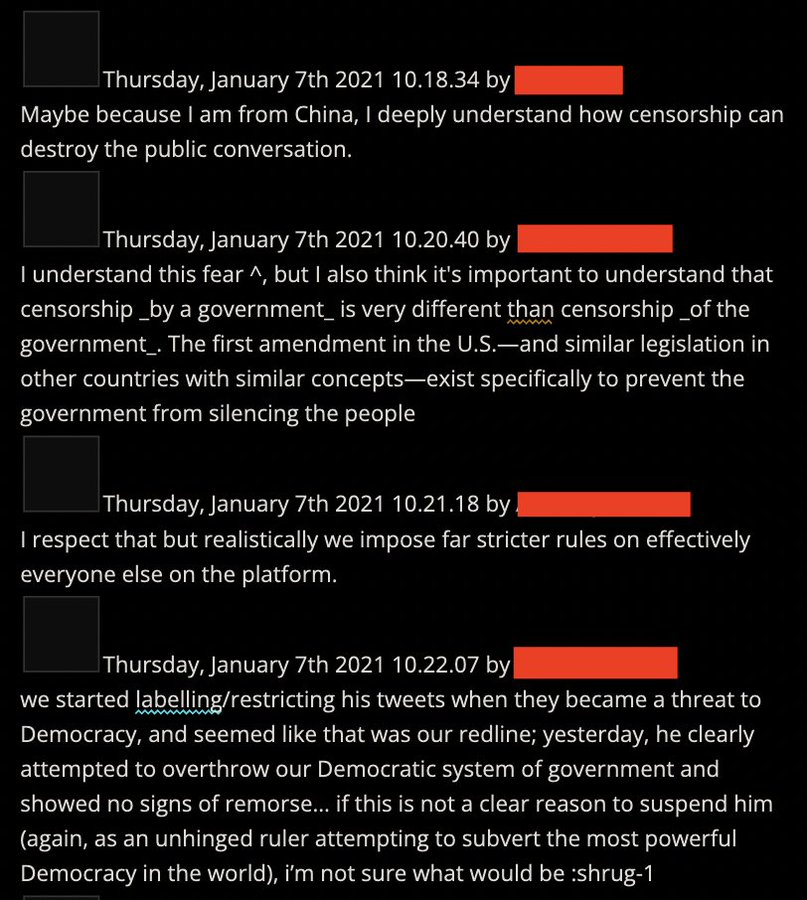
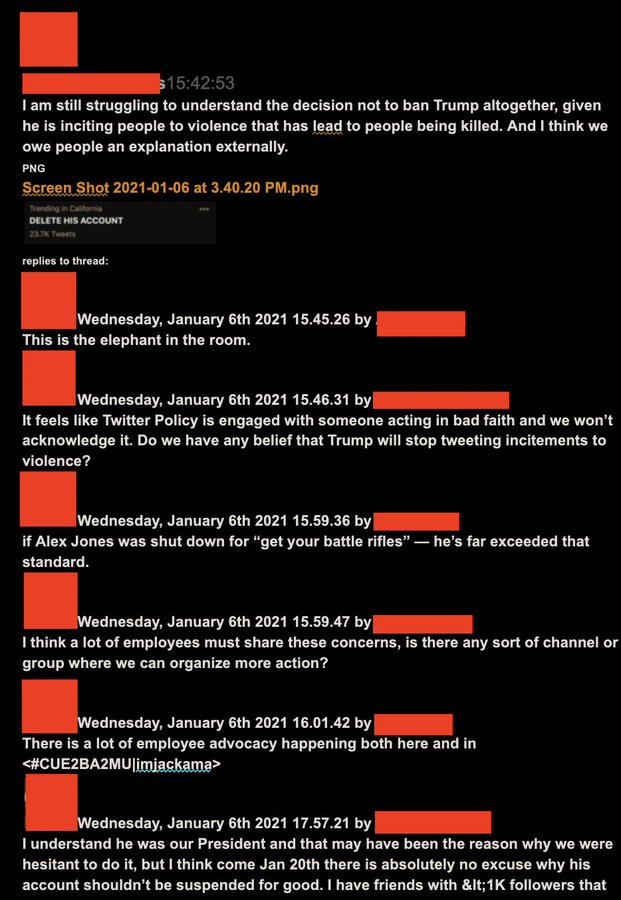

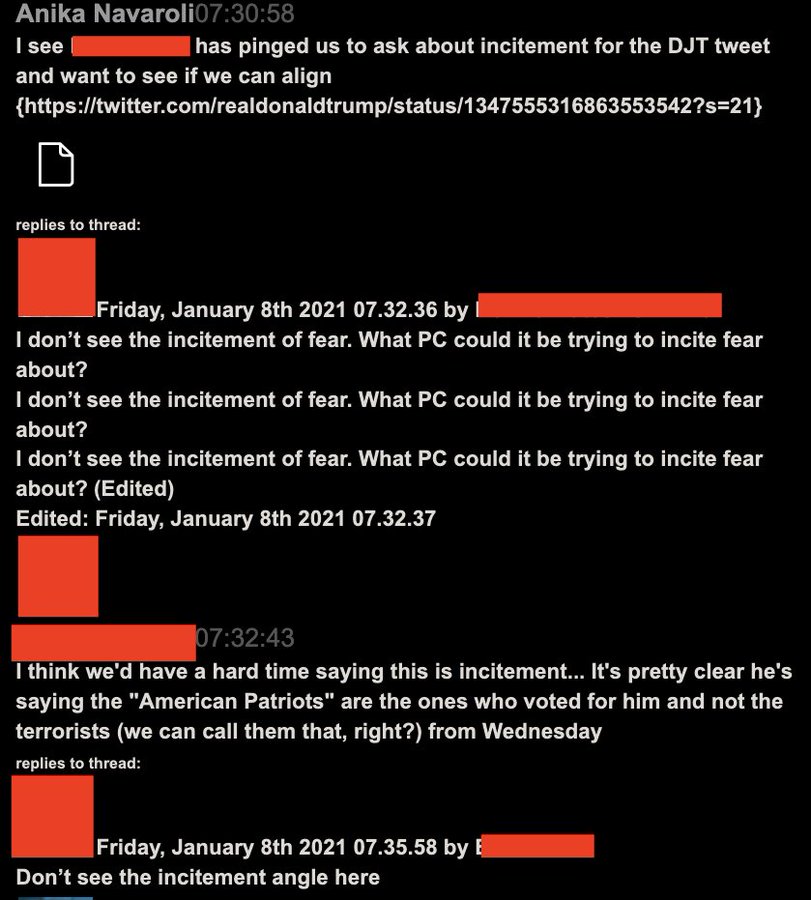
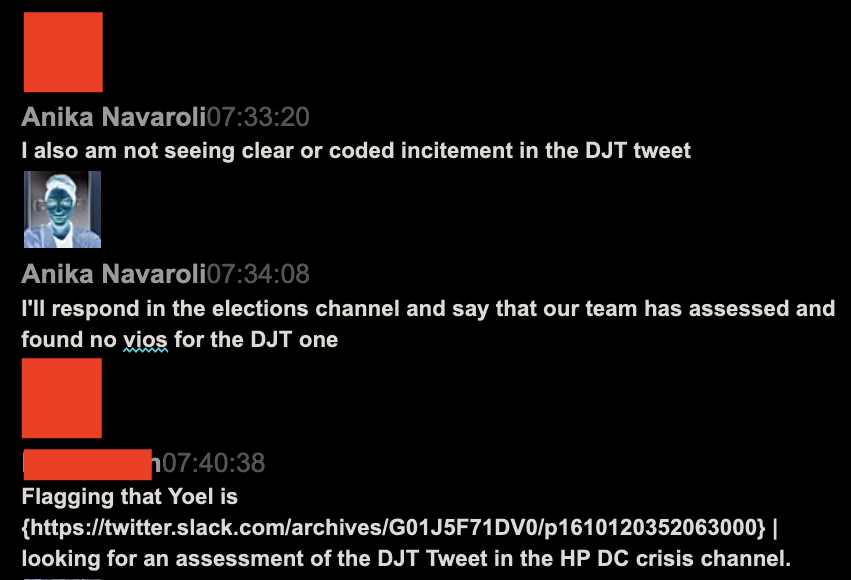
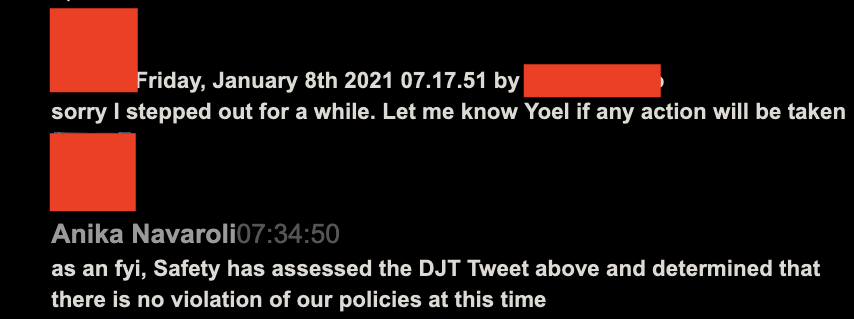
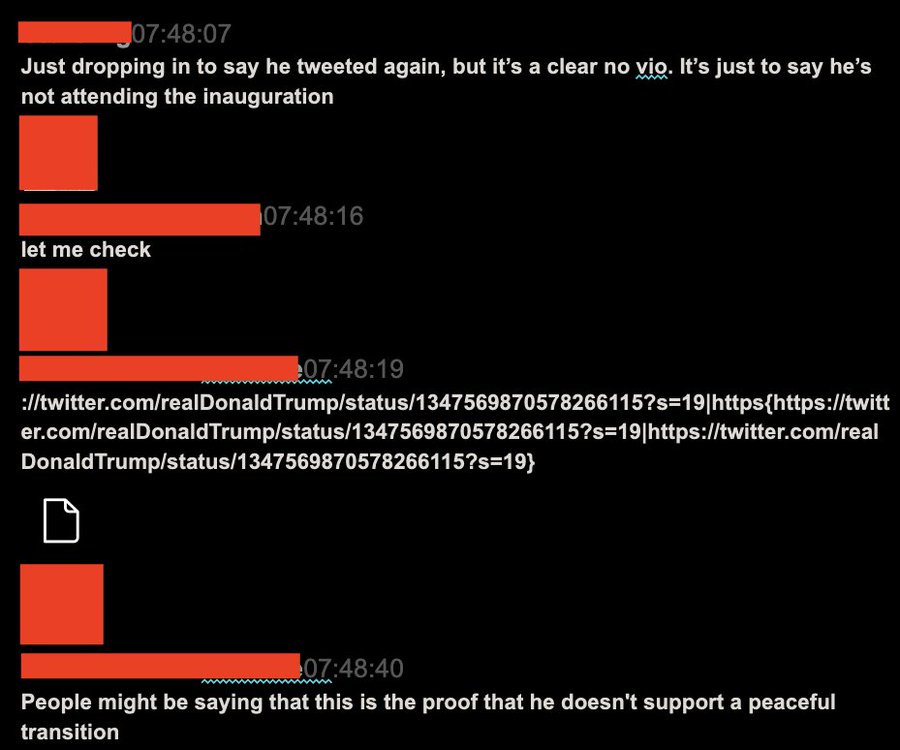
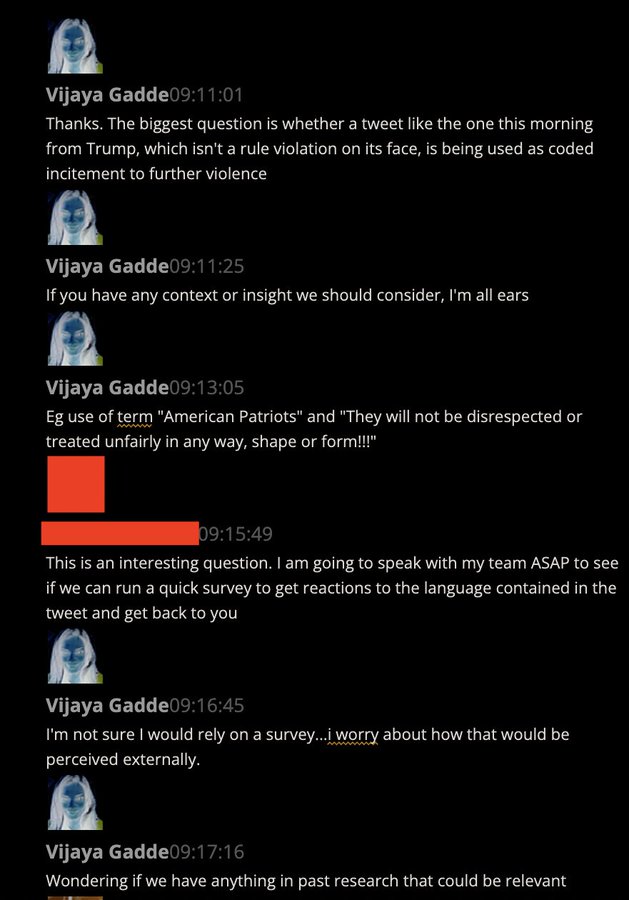
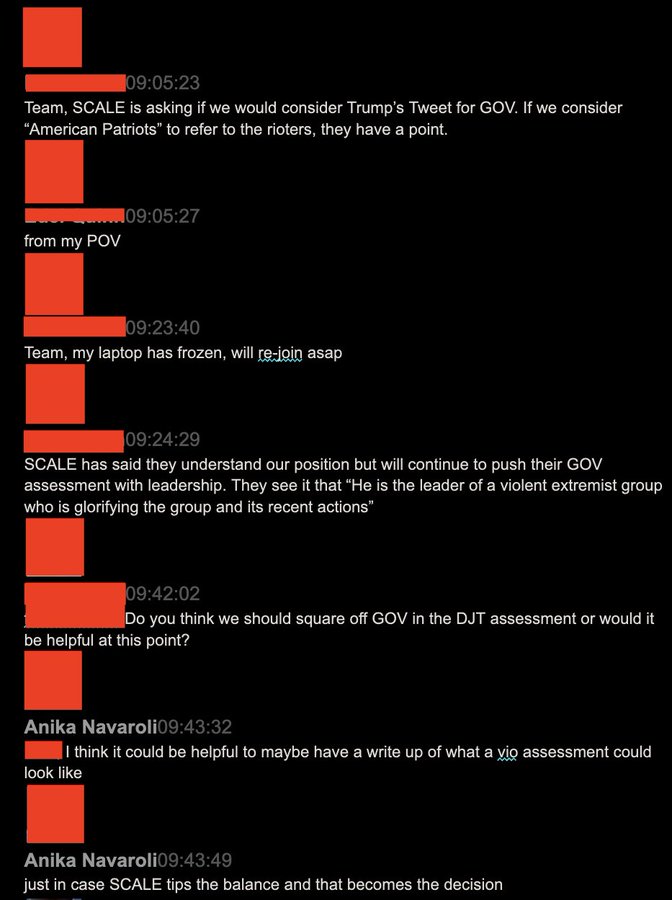

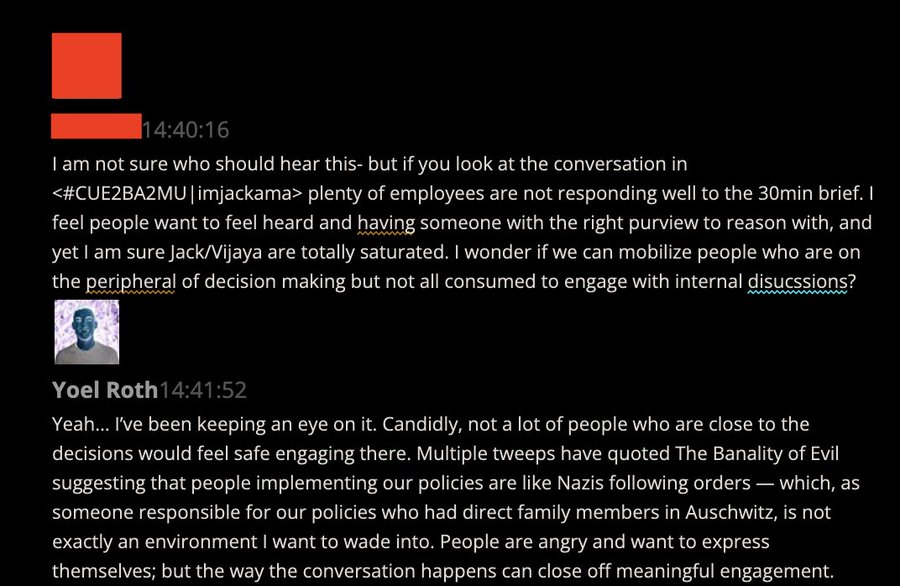
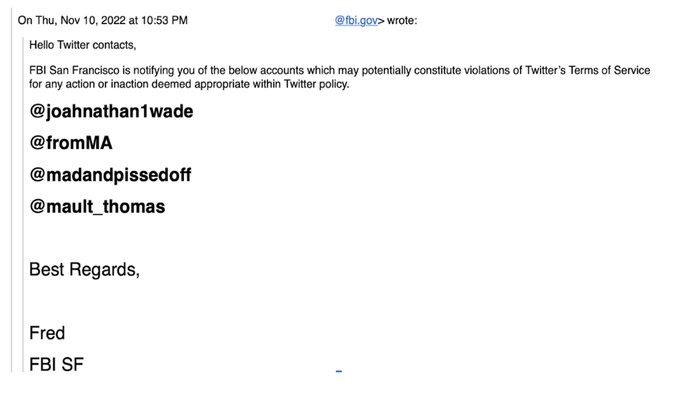
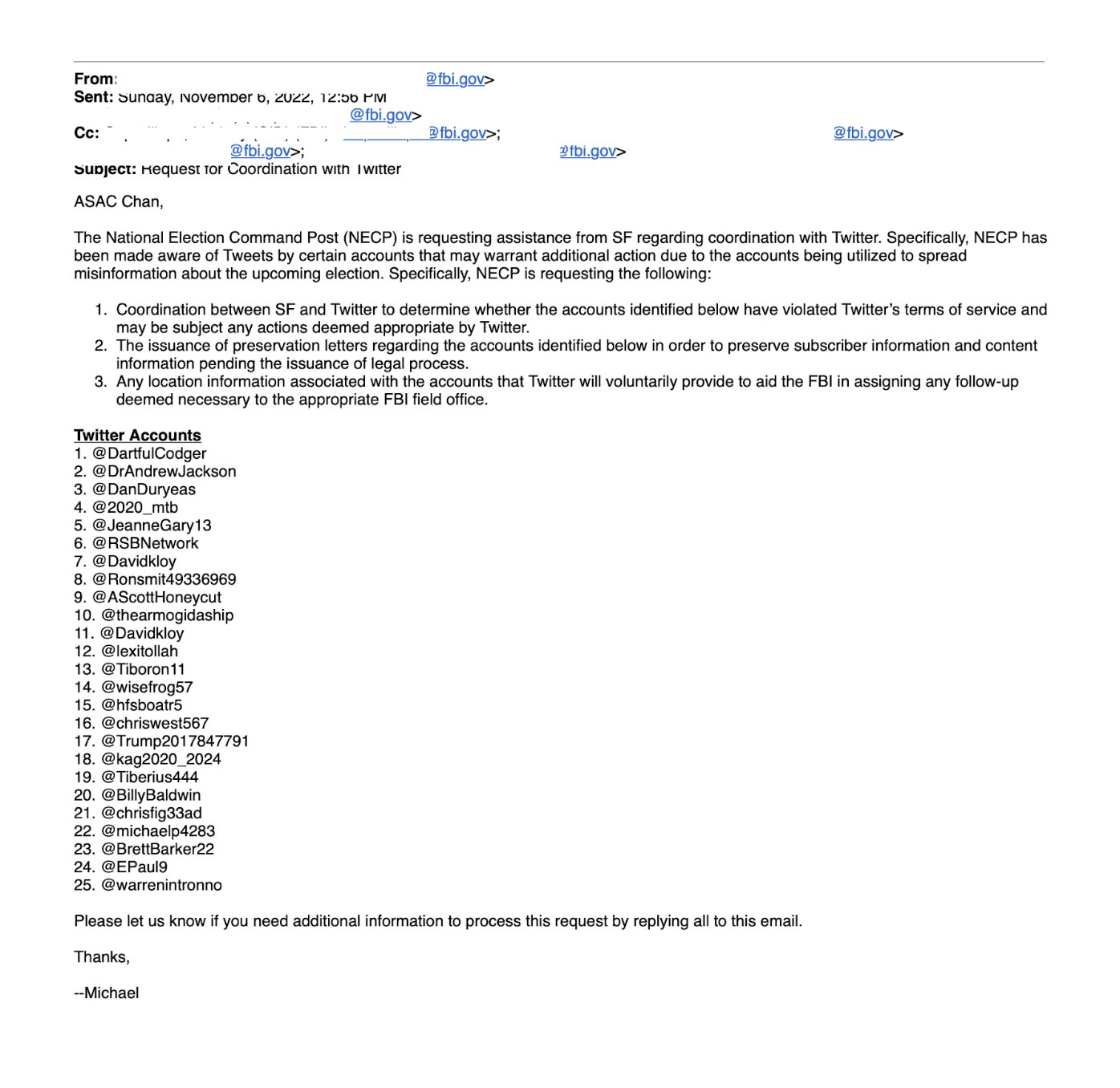
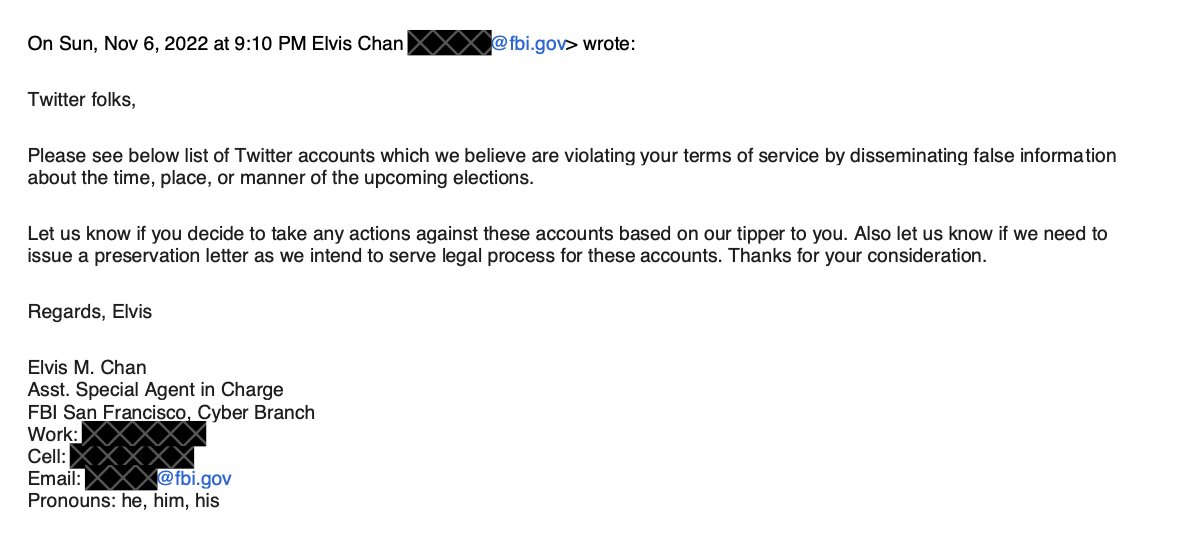
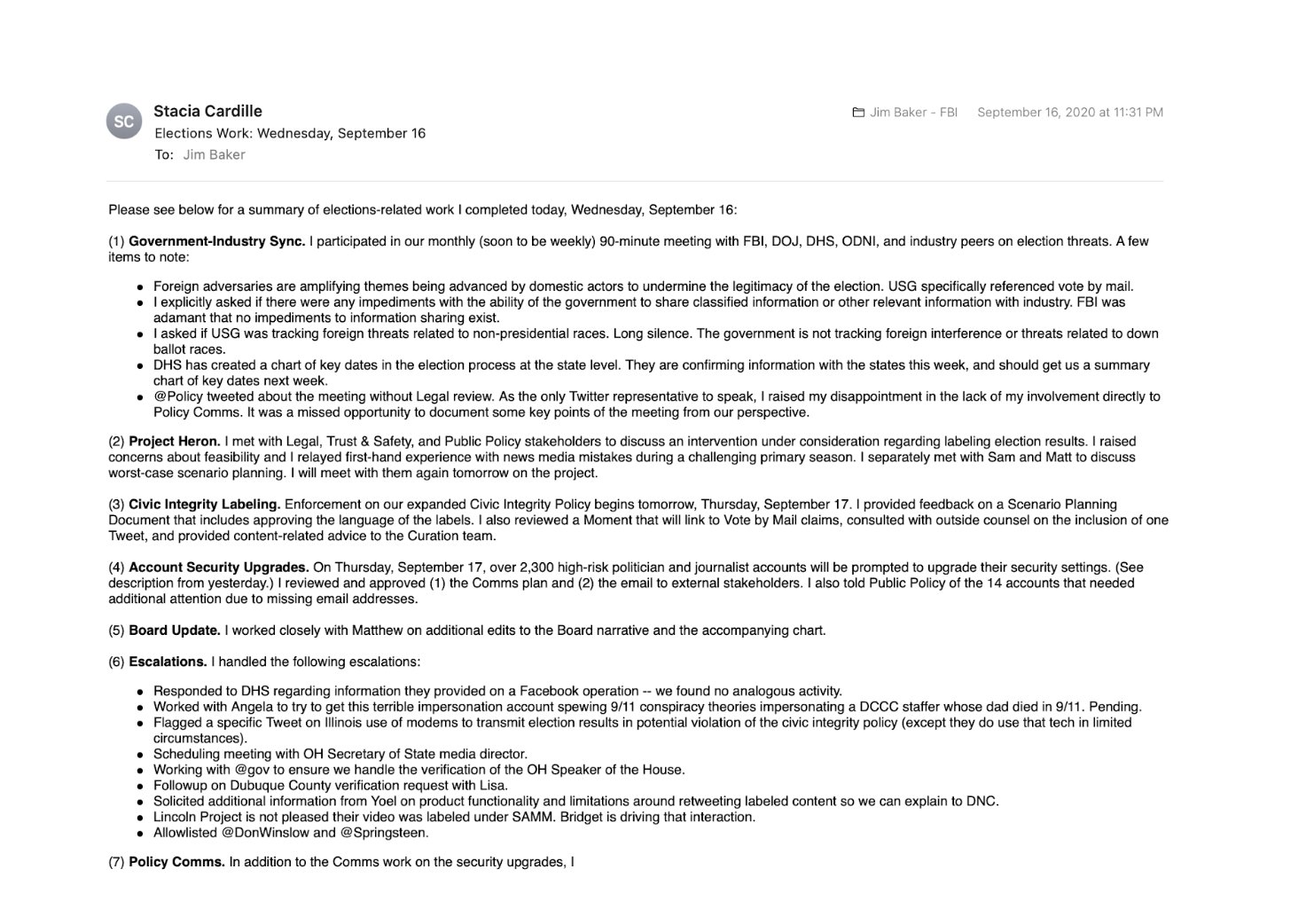 D’une certaine manière, Trump avait raison. Il y avait un complot dans les coulisses, qui a à la fois mis fin aux manifestations et coordonné la résistance des PDG. Les deux surprises sont le résultat d’une alliance informelle entre des militants de gauche et des titans du monde des affaires. (…) [C’était] une cabale bien financée de personnes puissantes, issues de différents secteurs et idéologies, travaillant ensemble dans les coulisses pour influencer les perceptions, changer les règles et les lois, diriger la couverture médiatique et contrôler le flux d’informations. Ils ne truquaient pas l’élection; ils la fortifiaient. (…) En fin de compte, près de la moitié des électeurs ont voté par correspondance en 2020, pratiquement une révolution dans la façon dont les gens votent. Environ un quart ont voté tôt en personne. Seul un quart des électeurs ont voté de manière traditionnelle: en personne le jour du scrutin. (…) La philanthropie privée est entrée en lice. Un assortiment de fondations a contribué des dizaines de millions de dollars en financement de l’administration électorale. L’initiative Chan Zuckerberg a apporté 300 millions de dollars (…) Le soulèvement pour la justice raciale déclenché par l’assassinat de George Floyd en mai n’était pas avant tout un mouvement politique. Les organisateurs qui ont contribué à sa direction voulaient tirer parti de son élan pour les élections sans lui permettre d’être coopté par les politiciens. Nombre de ces organisateurs faisaient partie du réseau de Podhorzer, des militants des États du champ de bataille qui s’est associé à la Democracy Defence Coalition pour des organisations ayant des rôles de premier plan dans le Mouvement pour les vies noires. (…) Le soulèvement de l’été avait montré que le pouvoir du peuple pouvait avoir un impact énorme. Les militants ont commencé à se préparer à reprendre les manifestations si Trump tentait de voler les élections. «Les Américains prévoient des manifestations généralisées si Trump interfère avec les élections», annonçait Reuters en octobre, l’une des nombreuses nouvelles de ce genre. Plus de 150 groupes de gauche, de la Marche des femmes au Sierra Club en passant par Colour of Change, de Democrats.com aux Socialistes démocrates d’Amérique, ont rejoint la coalition «Protégez les résultats». Le site Web du groupe, aujourd’hui disparu, contenait une carte répertoriant 400 manifestations postélectorales prévues, qui devaient être activées par SMS dès le 4 novembre. (…) Fox News a surpris tout le monde en appelant l’Arizona pour Biden. La campagne de sensibilisation du public avait fonctionné: les présentateurs de télévision se mettaient en quatre pour conseiller la prudence et encadrer le décompte des voix avec précision.
D’une certaine manière, Trump avait raison. Il y avait un complot dans les coulisses, qui a à la fois mis fin aux manifestations et coordonné la résistance des PDG. Les deux surprises sont le résultat d’une alliance informelle entre des militants de gauche et des titans du monde des affaires. (…) [C’était] une cabale bien financée de personnes puissantes, issues de différents secteurs et idéologies, travaillant ensemble dans les coulisses pour influencer les perceptions, changer les règles et les lois, diriger la couverture médiatique et contrôler le flux d’informations. Ils ne truquaient pas l’élection; ils la fortifiaient. (…) En fin de compte, près de la moitié des électeurs ont voté par correspondance en 2020, pratiquement une révolution dans la façon dont les gens votent. Environ un quart ont voté tôt en personne. Seul un quart des électeurs ont voté de manière traditionnelle: en personne le jour du scrutin. (…) La philanthropie privée est entrée en lice. Un assortiment de fondations a contribué des dizaines de millions de dollars en financement de l’administration électorale. L’initiative Chan Zuckerberg a apporté 300 millions de dollars (…) Le soulèvement pour la justice raciale déclenché par l’assassinat de George Floyd en mai n’était pas avant tout un mouvement politique. Les organisateurs qui ont contribué à sa direction voulaient tirer parti de son élan pour les élections sans lui permettre d’être coopté par les politiciens. Nombre de ces organisateurs faisaient partie du réseau de Podhorzer, des militants des États du champ de bataille qui s’est associé à la Democracy Defence Coalition pour des organisations ayant des rôles de premier plan dans le Mouvement pour les vies noires. (…) Le soulèvement de l’été avait montré que le pouvoir du peuple pouvait avoir un impact énorme. Les militants ont commencé à se préparer à reprendre les manifestations si Trump tentait de voler les élections. «Les Américains prévoient des manifestations généralisées si Trump interfère avec les élections», annonçait Reuters en octobre, l’une des nombreuses nouvelles de ce genre. Plus de 150 groupes de gauche, de la Marche des femmes au Sierra Club en passant par Colour of Change, de Democrats.com aux Socialistes démocrates d’Amérique, ont rejoint la coalition «Protégez les résultats». Le site Web du groupe, aujourd’hui disparu, contenait une carte répertoriant 400 manifestations postélectorales prévues, qui devaient être activées par SMS dès le 4 novembre. (…) Fox News a surpris tout le monde en appelant l’Arizona pour Biden. La campagne de sensibilisation du public avait fonctionné: les présentateurs de télévision se mettaient en quatre pour conseiller la prudence et encadrer le décompte des voix avec précision. 


 Publié par jcdurbant
Publié par jcdurbant 




